#can you tell i like medieval and classical warfare
Explore tagged Tumblr posts
Text
archers being skinnier and weaker compared to melee fighters is such a funny trope knowing that in real life armies they tended to have a lot of upper body strength, considering that their jobs were to use bows with over 100 lb draw weights, then run away to stay out of enemy range.
with the four characters in the greil mercenaries that can use bows (shinon, oscar, boyd, rolf), it’s interesting to see that boyd is the only one with the sort of musculature you might expect for that sort of role. oscar and rolf are both justified in that the former is a mounted unit, who tended to be pretty lean to account for the flexibility necessary to fight on horseback, and the latter is literally a teenager, but idk what shinon’s excuse is. no wonder he gets his shit wrecked by ike
#at least their strength bases/growths reflect it well#i know that in the modern age archers tend to come in all sorts of shapes and sizes#but in classical/medieval warfare when archers were#1. trained from early childhood to use bows#and 2. using long bows that could get to draw weights of a whole ass person#the trope being so prevalent in fire emblem outside of warrior classes using bows is a little funny#can you tell i like medieval and classical warfare#tellius
27 notes
·
View notes
Text
Fire Emblem and Aesthetics-A Mini Discussion
So for those who don't know, I don't really play Fire Emblem Heroes, but I still have an interest in seeing what units they release. Usually for fanfic purposes or just keeping track of new resplendent designs. But recently, FEH had an update for the original character of Dagr and it got me thinking about how resplendent from jotunheim look

Combined with FEH's ongoing storyline of taking from Norse mythology it really made me think-"Wait, why don't we have a Norse Fire Emblem game?"
Now look, I'm not here to bemoan that FEH don't have a console version, non gacha style game, but it really got me thinking about how we may be missing out on something relating to the use of a rich mythology and it only being in a mobile game more about collecting waifus and husbandos.
You see, Fire Emblem is no stranger to cribbing from existing mythologies like Norse in Genealogy, Arthurian myth and the matters of France in Elibe, and several characters just straight up being named after mythological/classic literature characters like Beowulf, Sampson, Priam etc. But its always done in this relatively Anglo-Saxon-British-French homogeny of aesthetics for their tales. So we can have a character named Sigurd, but he's not gonna look like he's fresh off the Viking Ship. Now Fire Emblem isn't the only franchise to do this, many pieces of media made by other countries draw upon these sort of exaggerated/romanticized look for fantasy stories all the time. And I want to be clear I am not advocating for "Medieval accuracy," I think that's silly. What I'm more getting at is I feel like FE could do with changing up its setting/aesthetics to perhaps inspire newer experiences.
Now I'm not saying FE as a franchise needs to be reinvented. In fact, I think FE has one of the most universal accessible mechanics in turn-based gaming. Simple to pick up, but still able to create many difficult maps and challenges. And by this point has made the support system one of the most iconic in gaming. But if the mechanics are good, doesn't that mean it could be transplanted into another setting? Well, In a way, yes. But once again, I'm not advocating for FE to stop being this fantasy style sword and sorcery story and become like the Napoleonic wars.
(That is a real Nintendo game by the way. Its wild!)

No what I'm saying is that the broad terms of "Middle Ages Warfare" is much more than simply a certain type Eurocentric fantasy.
I'll tell you what, as much as people like to rip on Birthright, I'm still shocked how it took so long for Fire Emblem to have a game where Japanese culture and aesthetics is super prominent and a main setting for a game. Fire Emblem tends to have one character who is obviously inspired by Japanese culture or even sometimes a single country. But a full blown game where so many characters come from and embrace this Japanese backdrop was unique.

Now of course it was still Birthright, so while you got these cool glimpses of a unique world and story like the Oni inspired Flame Tribe, the start of having a lot of retainers as main characters, the monk class and using fans as a weapons, and even roping in Kitsune. It still doesn't really do much than an average FE adventure with them. But it did at lease prove the the FE formula *could* still work removed from its conventional trappings.
Another in the different aesthetic, but missed opportunity category would be Fire Emblem Three Houses country of Almyra being pretty heavily inspired by Persian/Middle Eastern culture. A country that was gesturing so hard at an interesting idea that its left fan artist and fanfic writers to swoon over the idea of a possible FE game set in Almyra.


And if you want an even more recent example, for all the desert backdrops we've had in Fire Emblem, its kinda astounding it wasn't until Engage that we got a lightly (And admittedly exaggerated) African inspired country.

When I see stuff like this and what FEH is doing it makes me realize that we could be getting more. Im sure the next FE will likely still lean on its typical fantastical Anglo-Saxon look, but eventually there's got to be some spice to it. Sure it may be different, but Fire Emblem is a franchise that with each entry does try to be something different while maintaining certain core gameplay elements. So what is the harm of trying to approach something that looks a bit different?
Im not asking for an extreme change right away. Maybe start lighter. We have tons of pirates in Fire Emblem, why not a pirate/sea based game? We've even had the rare few pirate as a playable character. Its a type of story that could be told within the typical Fire Emblem world.

Then perhaps maybe something a bit more culturally ubiquitous like Greeco-Roman inspired FE? There's plenty of gods and magic, but also swords and spears to draw forth on. Heck, that may even open up new potential enemies or stories to tell with like an Evil Senate or a Gladiator culture. It could even push FE to maybe drop or reinvent certain tropes like how they approach the knighthood type of character where a certain culture's version of knight is different. Maybe even make new classes the way Birthright had to.
Overall, I think Fire Emblem is and always has been a malleable franchise. And because of that, I think it can afford to take certain risks on something as simple as drawing from another culture during the medieval magic era, while still being able to provide things that people still love about the franchise like the combat system and support system. Will there be push back on it looking different? Of course, I remember when Three Houses first teasers dropped and everyone was wondering what was up with the military school outfits and what even race was Claude. And of course a different aesthetic doesn't make the game automatically good. But let's remember, that people were judgmental of Birthright not because it went all in on looking Japanese, but because the general story and writing was lackluster for many.
But if you can make an interesting and likable cast of a characters that elevate the story, and make a memorable world for people to wage war in, I see no reason why you couldn't make Fire Emblem work set in the Netherlands.

If there is a personal aesthetic or theme you'd like to see Fire Emblem tackle, sound off in the replies. I'd love to hear what you guys think.
#fire emblem#fire emblem heroes#feh#dagr#nephenee#almyra#solm#norse mythology#fire emblem three houses#fire emblem birthright#fire emblem fates#fe fates#fe3h#claude von riegan#ryoma fire emblem#takumi fe#takumi fire emblem#fe corrin#corrin fire emblem#corrin#sakura fire emblem#hinoka fire emblem#fe14#timerra#timerra fire emblem#veronica fire emblem#discussion
17 notes
·
View notes
Text
Ghost of Tsushima and the Hands of Fate
I see we're still trying to prove that games are an art form by making everyone feel bad.

For the record, Ghost of Tsushima is one of my favourite games in a very long time. It is extremely pretty, the aesthetic and general … polish is *cheff's kiss*. You can pet foxes and backstab people. The fighting mechanic is decent and there are just So Many Hats.
But also, it has the kind of story that pulls you in to the point where you have to drop the controller to hide behind your fingers going 'ohgodno'.
It is an absolute bastard of a game, is what i'm saying.
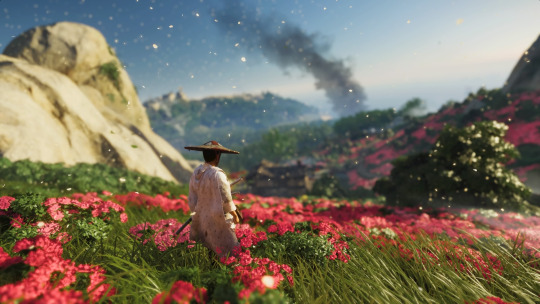
So let's talk about that, and specifically about Straw Hat Ryuzo and how I feel bad for him.
I am, by the way, going to be talking about the narrative structure of a video game about medieval samurai, so expect like, a bunch of spoilers.
The narrative is one of the big draws in Ghost of Tsushima. Like yes, it's an open world rpg with fighting and flower picking and all the important stuff, and also yes, some of the bits are sloppily written (looking at you, specifically, 'Ending to Norio's Arc'), but the game definitely sets out to Tell a Story.
And because this is a Serious Game that openly bases itself on samurai movies like Kurosawa's, it is a Drama.
In many ways it is an utterly brutal Bildungsroman, a narrative in which a young man finds his identity.
I have joked with friends about the clear intent for this game to make Important Stories, in that it actually tries to tick all the boxes of hotbutton subjects: childhood trauma? Obviously. Gay relationships? Yup. Survivor's guilt and PTSD? Oh yes. Domestic abuse? Several. Suggested pedophilia? Damn, even that.

The foxes are there to soothe the soul
It's interesting to note that from a writing point of view, this bildungsroman is even Very Classically Structured. It goes so far as to be a three acter, with a pretty standard build-up.
Jin Sakai, traumatized man that he is, spends the first act slowly getting to grips with the bit where you don't fight an army by yourself by just walking up to them and challenging them With Honour, like he has been taught his entire life. Instead of getting stabbed repeatedly in the chest and set on fire, he discovers guerilla warfare and creates this persona of the Ghost, a literal vengeful spirit seeking justice for the island of Tsushima.
It gets him some big wins and in the second act he slowly embraces this identity until things get to a head where he clashes with his entire old life. The third act starts at the hero's lowest point and is utterly gut wrenching (i am Still Not Over the horse, game), forcing him to pull himself together for an ending that is, well…fitting for the narrative. It's an ending that is needed, but perhaps not what Jin deserves.

But anyway, this is about Ryuzo, and how until that ending, I was very upset about his role.
You see, this story is told in part through the lives of Important Npc's, who contribute to Jin's journey of self-discovery. This is pretty obvious with someone like Yuna, who is the one to introduce him to the Stealth Life and who is a driving force behind the marketing of the Ghost.
Someone like Masako, meanwhile, portrays vengeance and self discipline, but Jin also kinda tries to make her fill the mother-shaped hole in his heart.
Lord Shimura, meanwhile, is an Obvious Father figure but also stands for Jin's past. He's rigid and ineffective, which pushes Jin to further look for alternatives.
Ishikawa, that other mentor figure, is more moderate and flexible, but he also represents a possible unwanted future. He literally warns Jin at one point not to become like him.
Norio, then, is as mentioned not the best written, but he too is a person that searches for his destiny and tries to become like his hero, while only barely holding on to his sanity.
Kenji, I'm sorry, I love you but you're just comic relief, that's all you do. It's an imporant job in the story, because god does it need it, but you're not teaching Jin anything other than how to make different 'resigned sigh' noises.

So what about Ryuzo? From the very beginning, Ryuzo's story didn't really sit right with me. There's the obvious class issue: he's one of the few important npc's that are poor, and he's an Antagonist.
It has always rubbed me the wrong way that his original intentions were good, depending on how you read it. He's trying to feed his men. He essentially made the decision that this one man's life (even if it is an old friend) is worth the price for the lives of his band of ronin.
It's a lot more complex than that, of course. Ryuzo partly blames Jin for his predicament in life, and he also knows that samurai treat their soldiers as chattel, which the game goes out of its way to show you they DO.
Essentially, he's a complicated character who makes bad decisions for arguably good reasons.
Ryuzo did everything he could to save the lives of the people he cared about. He went so far as to abandon his honor and his childhood friends, to try to make this happen.
Does that ring any bells?
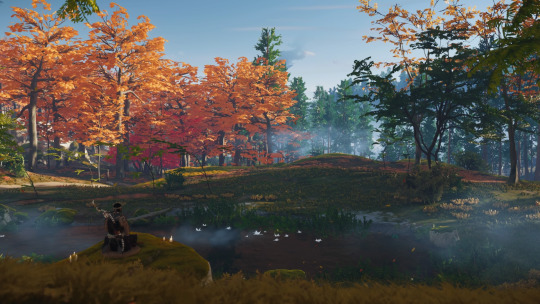
It kinda clicked for me at the very end of the game.
Jin, being the protag in an assassin game, does a lot of killing. But some of these deaths are given more meaning than others. Some of them are there to make you feel like shit (the Horse Again, but you lose several friends along the way), others serve a more defining purpose.
You see, there's a fair amount of what i'd like to call 'intimate violence' in Ghost of Tsushima. It's an old trope. The 'if someone was gonna kill me, it had to be you' kinda scene that hails from a worldview in which some deaths are better than others, sure, but some deaths are better even than living. It's a worldview in which life itself is less valuable than your legacy. You die for your place in history. For your clan, for your family, for your honor.
Bushido is full of that sort of thing, so it makes sense that a game building on that worldview, would use the heck out of that trope.
The first is Ryuzo's death. You fight him in a duel, in which he tries to plead for some resolution. You could let him go, come up with some story. But Ryuzo is a traitor, so Jin ultimately defeats him and sends him off in what would be a touching moment of bro friendship if it wasn't for the blood and my 21st century sensibilities.
You grant him a warrior's death, is what I'm saying.
It happens again with Shimura. The game actually gives you a choice here, but if you go through with it, the scene almost perfectly mirrors Ryuzo's.
You fight in a duel, and Jin tries to get his uncle to just let him go, come to some kind of resolution. But Jin has been branded a traitor, and the only way for Shimura to restore his honour and clan, is to take his life;
This being a game in which you have the power of bamboo strikes and also save games behind you, Jin ultimately wins the duel, and has the option of granting Shimura a warrior's death.
It is utterly heart wrenching and that whole scene has no business being as pretty as it is. The swelling music? The fucking strings? The anguished yell?
Fuck.

But anyway.
That's about where it clicked with me, that Jin never had a choice.
Ryuzo's whole role wasn't fair, but this is one of those stories where life itself is just not fair at all.
Both him and Shimura are there to show us Jin's path.
What if, the game says, Jin had listened? What if he'd taken one of several offers the Khan made and surrendered?
What if he'd cooperated?
Well, we see in Graphic Detail what would happen. He would get pushed into doing horrific things. He gets manipulated, again and again, until there is no way out anymore. At some point it becomes clear to him that he's on the wrong side but whenever he tries to devise some plan to turn things around, things go Badly. He's firmly stuck in Khotun's web and the only way out is death.
But what if, the game says, Jin had stayed true to his honour? What if he had listened to his uncle, not defied him, if he had dropped the Ghost before it was too late? If he'd gone full bushido and repented for the shogun and done all the groveling and the proper stuff.
Samuraihood is just another straightjacket, says Shimura's fate. The tenets are so rigorous you would take your loved ones life, while fucking bawling your eyes out. Shimura knows damn well it's unfair but he also has no way to leave this path. It's a ride he cannot, and will not, get off alive.

Jin never had a choice.
There was only ever one way for him to go.
Like let's be real: pretty much everyone in this story was dealt a bad hand. It's a narrative about resilience in the face of utter horror, of reinventing yourself and giving up entire structures of faith. People like Masako, Yuna, Norio are finding peace in dealing with huge levels of trauma and regret.
The goal isn't to start a family and live happily ever after, it's to Survive.
Submitting to the mongols would have killed Jin's spirit. Standing tall and rigid as he was taught to do would have, ultimately, killed him as well.
"I've given up everything to save these people", he says near the end. "And I would do it again."
That's someone who has no regrets.
Jin never could have taken another path and he knows it.
And this is why Ryuzo needed a fate as shitty as his. He fell, so Jin could walk.
I'm sorry, it's still not fair.
This game needs some comfort fic.
#ghost of tsushima#jin sakai#ryuzo#narrative analysis#story analysis#i have Many Feeling ok#and this is how i deal with them#ghost of tsushima spoilers#gots spoilers
65 notes
·
View notes
Text
My Year in Books, 2020
Introduction
I don’t want to waste your time, dear reader, with a list of all the books I read in 2020—you can track that on my Goodreads, if you care—nor even a list of all the books I wrote about on my site. But I would like to take the occasion of New Year’s Eve to revisit some of my favorites. Please click below for the list. Happy New Year!
1. Jane Austen, Sense and Sensibility
Reading old books can help us understand the present better than reading new books, which are often too caught up in today’s doxa to offer a true perspective on today’s world. Austen’s first major novel is a good example; what can help us understand class and gender better than this 19th-century narrative? As I wrote:
Marianne Dashwood (or Lily Briscoe or Sula Peace) has triumphed: today, she issues defenses of desire on podcasts and Patreon and posts pictures of her swollen ankle and putrid tonsils for the fetishists among her OnlyFans subscribers. If Elinor still functions as her conscience, she does so in the administrative bureaus of the corporation and university—human resources, diversity and equity—where her job is to intercept and interdict threats to the untrammeled unfolding of Marianne’s consciousness. This metamorphosis has undoubtedly liberated the individual from the stifling convention of bourgeois domesticity, but is the place where it has installed her now, where she must sell soul and body by algorithm just to stay alive, any less a prison?
I thought I’d get cancelled for that one, but nobody seemed to notice. Here’s another chance, cancel crew!
2. Giovanni Boccaccio, The Decameron
Like everyone else and for obvious reasons, I read The Decameron in 2020, but it didn’t make much of an impression, besides its historical interest. This might be the problem:
The late medieval personae and settings are different from the postmodern ones: clergy in place of technocrats, princes in place of corporations, and a network of land and sea routes where fiberoptic cables now run. But Boccaccio himself, in writing a comic prose work that has, according to the scholar Robert Harrison, been called “a mercantile epic,” did much to prepare the way for our world.
I’m sure this is a mix of presentism and philistinism talking, but a literary culture divided between Dante and Boccaccio would seem to have something wrong with it. The best writers earlier and later—Homer and Sophocles, Shakespeare and Joyce—seem capable of synthesizing what in Dante’s divine comedy and Boccaccio’s human comedy are held forcibly, artificially apart.
3. James Miller, The Passion of Michel Foucault
I review a scandalous biography of the theorist who may or may not have made our contemporary world:
His identification of a new oppressed class, and his observation of oppressive power structures working in precisely those institutions meant in the modern period to correct the “barbarities” of ages past with their torture chambers and ships of fools, would change the western left forever. The “abnormal” subject (rather than the worker) was now the protagonist of history, power (rather than exploitation) the mechanism of oppression, and modern scientific and liberal institutions (rather than capitalist economics) the enemy. Foucault’s anti-psychiatry stance is now in abeyance—a recent viral Tweet promised that “under socialism all men will be sent to therapy,” an old chestnut of Stalinist terror that redefines political dissent as mental illness in an instance of exactly the thinking Foucault meant to challenge. But the drift of his thought, toward the emancipation of western reason’s underside, still defines for many what it means to be on the left today. If the left once promised, per the Internationale, “reason in revolt,” Foucault offered unreason in revolt.
4. Plato, The Republic
A much misunderstood book, in my view:
Socrates clearly describes the defects of the soul’s non-rational divisions; by contrast, reason, ordained as it is to apprehend the perfection of the idea, is presumably faultless. Yet I would suggest that Socrates’s forgetting that divine inspiration is the source of poiesis, even as he utters poetry in praise of reason, is a flaw. If the fault of the soul’s appetitive part is an insatiable quest for more and more physical satisfaction, and if the fault of the soul’s spirited part is a desire for victory or conquest without limit, then might we not theorize a parallel danger in the soul’s rational part? And doesn’t Socrates exemplify this danger when he follows the autonomous logic of his argument past all experience, including the poet’s experience of divine inspiration?
What if we took up the hint and patterned contemporary novels on Platonic dialogues?
5. Umberto Eco, Foucault’s Pendulum
I have mixed to negative feelings about this cult classic, but I had fun introducing its conspiracy-laden plot with some paranoia of my own:
Finally, canvassing the Wikipedia entry on the novel before I read it, I found that among the endless occult paraphernalia Eco packed into the text was “[a]n obscure one-time reference to the fictional Cthulhu cult through a quote from The Satanic Rituals—‘I’a Cthulhu! I’a S’ha-t’n!’. The words closed a ritual composed by Michael Aquino.” Aquino was a high-ranking Satanist and a psychological warfare expert for the U.S. military; he co-wrote the notorious Pentagon position paper “From PSYOP to MindWar: The Psychology of Victory”. Understandably, he recurs again and again in the annals of American conspiracy theory: the politically paranoid on the right abominate him for his Satanism, while those on the left loathe his anticommunist and militarist commitments. Through a vector I’m not at liberty to disclose, I am only two of the proverbial degrees of separation away from Aquino, though I have obviously never met him or had anything to do with him or even discussed him with anyone who has. I imagine conspiracy theorists will promulgate this curious fact widely on the Internet to discredit me whenever I finally become as famous as I deserve to be, considering that I am one of America’s great writers. (Megalomania and paranoia: like horse and carriage.)
And no, I still won’t tell you how I’m connected to Michael Aquino.
6. Thomas Mann, Mario and the Magician
Writing on this classic semi-anti-fascist novella, I wondered whether “anti-” is always the solution:
It is an old problem: how not to become what we behold, how not to transform into one’s enemy—how to be sure anti-fascism doesn’t become fully indistinct from fascism itself. Given our psychology, with its tendencies toward projective and dichotomous thinking, and given political realities, which often make violent confrontation seem fated, this may be an insoluble problem. Perhaps every anti-[X] is doomed by the occult law of similarities to become [X]; perhaps our time is better spent in simply not being [X] rather than defining ourselves against and therefore by [X].
7. Cormac McCarthy, The Orchard Keeper
I took the opportunity of McCarthy’s preternaturally eloquent first novel to clarify a point of political economy:
As I insist on reminding everyone from time to time, even at the risk of repeating myself, Lenin argues in Imperialism, the Highest Stage of Capitalism (a book I don’t claim to understand in every particular) that the monopolization of capital is the necessary and final stage of history before communism. Monopoly represents “a new social order, a transitional one from complete free competition to complete socialisation”—i.e., let the corporations do the work of centralizing production so that the biggest corporate body of all, the state, can easily assume the economy’s commanding heights. Marxism, therefore, is not really a challenger to neoliberalism but only the loyal opposition. Hence the chief theme of McCarthy’s corpus: how the inherent flaws of humanity and nature, those organic defaults that make the marketplace a necessary evil in both serving and curbing self-interest, immeasurably worsen when magnified to the scale of organized planetary warfare in the very name of their correction by rationality—or, as a pair of unorthodox Marxists called it, the dialectic of enlightenment.
Conclusion
Speaking of the economy, though, my most important literary event of 2020 was the publication of my novella, The Quarantine of St. Sebastian House, my attempt to turn contingent crisis into permanent art. With that, I leave you. Let’s hope the poet had it wrong when he said, “Nothing changes on New Year’s Day.”
#literature#literary criticism#philosophy#critical theory#literary theory#jane austen#giovanni boccaccio#plato#michel foucault#umberto eco#thomas mann#cormac mccarthy
6 notes
·
View notes
Text
My Italy Vacation Photos Recreated in Assassin’s Creed
I’m putting them under the cut since they’re fairly large. I tried my best. A lot of times it’s not 1:1 because proportions were played with due to memory limitations. Oftentimes the piazzas certain monuments are located in aren’t large enough for me to get the same distance from the camera in the game as I did in real life. Also, the lack of a photo mode kept kicking me in the ass. Still, I’d like to think they returned out pretty well. I hope it captures the feeling I had when I was there in person, a feeling of familiarity.
FLORENCE
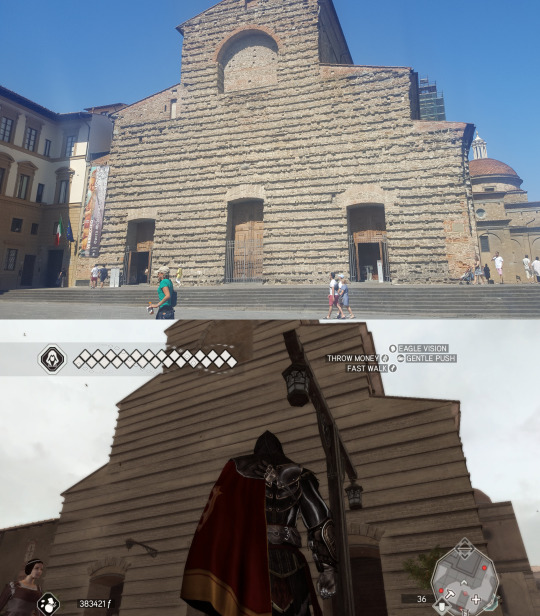
The Basilica of San Lorenzo, home of the Medici crypt. The street the basilica faces in-game is much thinner than it is in real modern life.
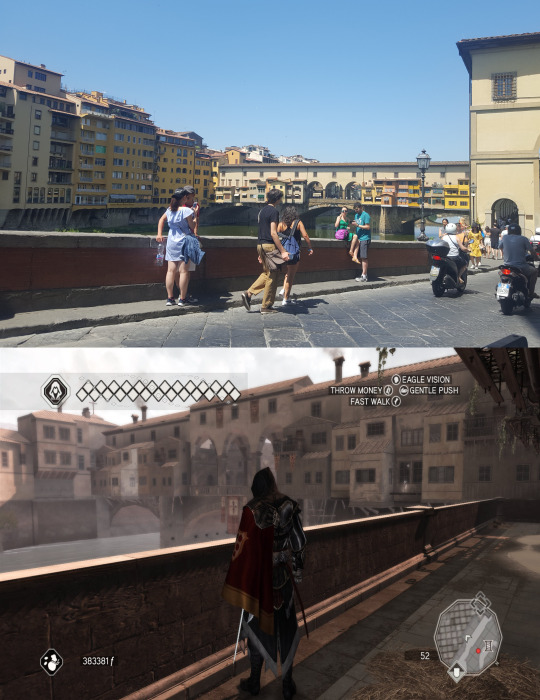
A view of the river Arno and the Ponte Vecchio. In the time of the game, houses bordered the street parallel to the river on this side. Ezio is actually standing in someone’s yard. The bridge itself had too much foot traffic for me to take a photo crossing it.
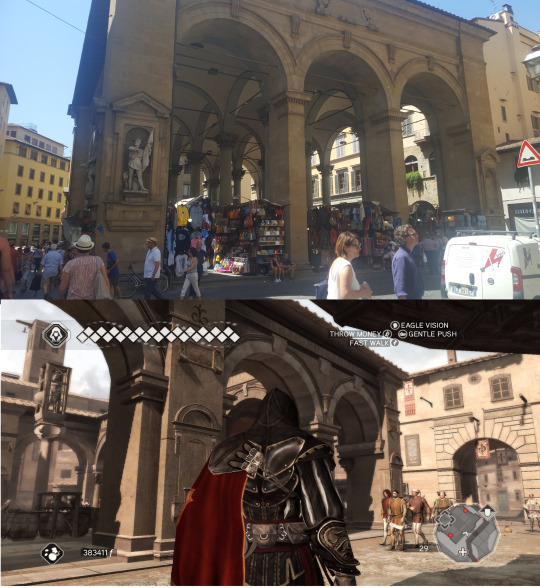
The Mercato Vecchio, Florence’s market. The covered area still acts as a market place today for street vendors catering to tourists.
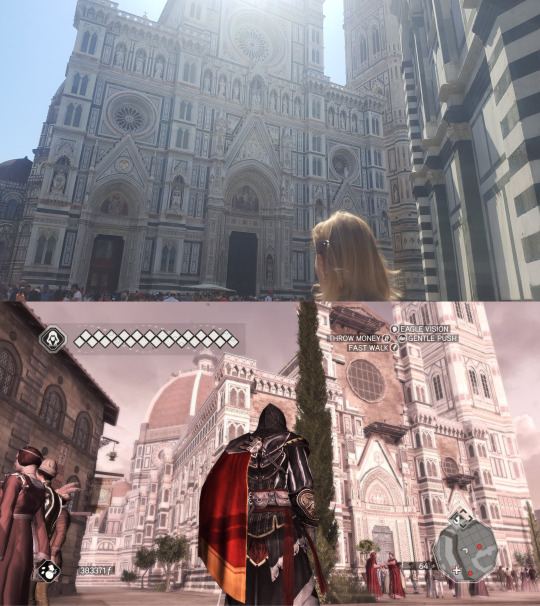
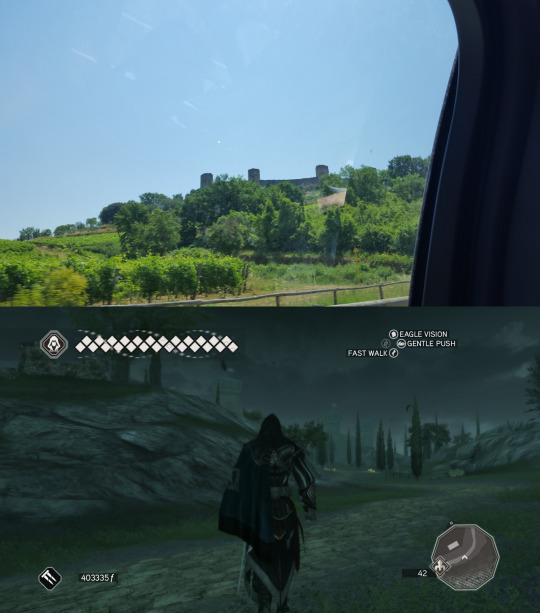

The Duomo/Basilica di Santa Maria del Fiore. The Baptistery near the Duomo is missing in the game due to technical limitations. The lack of detail on the facade is a combination of technical limitations and that some parts of the decoration had yet to be added.
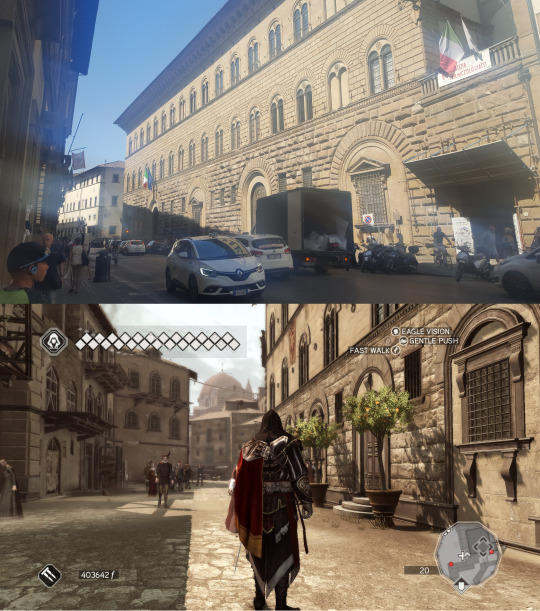
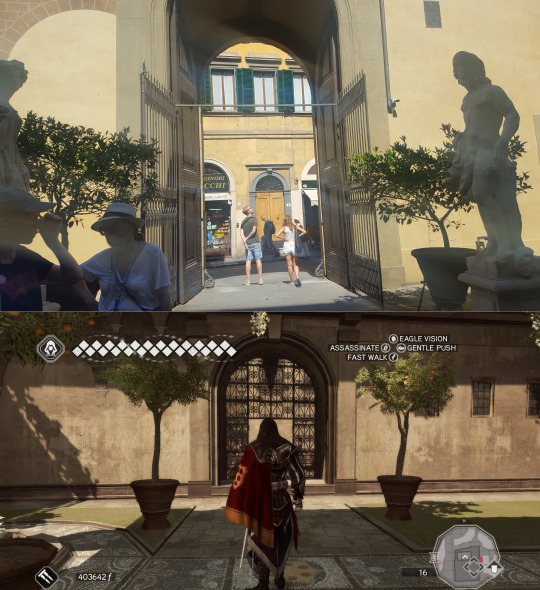
Palazzo Medici. While the game sizes the palace down, a lot of interior decorations were only added in the preceding decades as the Medici increased in power.
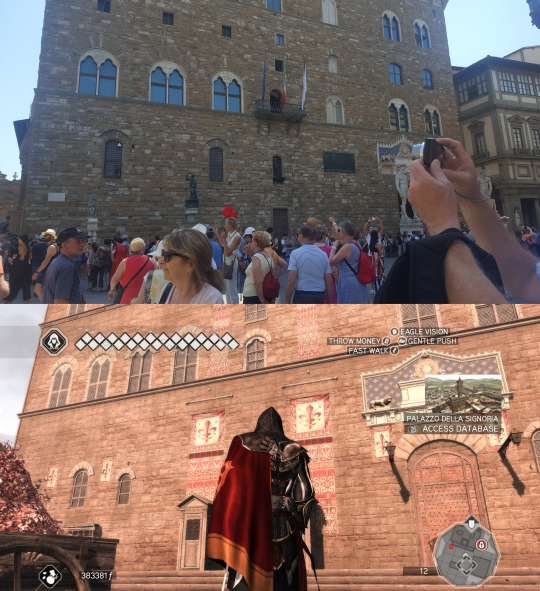
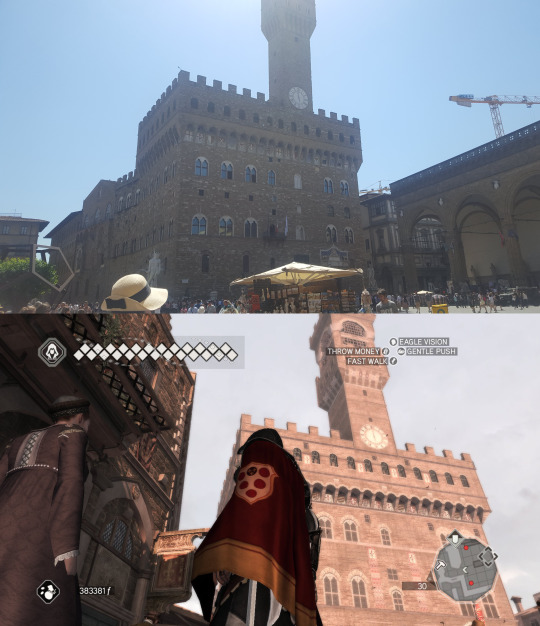
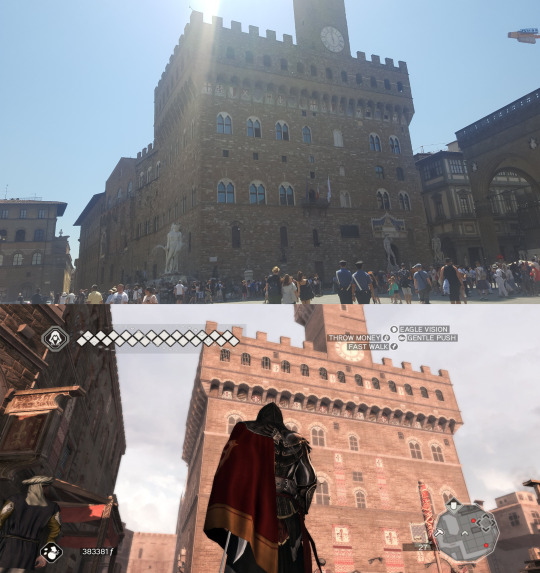
The Palazzo della Signoria. While the shrunk down piazza was one factor that limited my ability to recreate the photos, the gallows that executed the Auditorie family prevented me from standing in the correct position. And that isn’t just something left in the game world from a story event, but historical accuracy. Public executions were held in that square, standard for the time, but a fact I had forgotten and my tour guide didn’t mention.
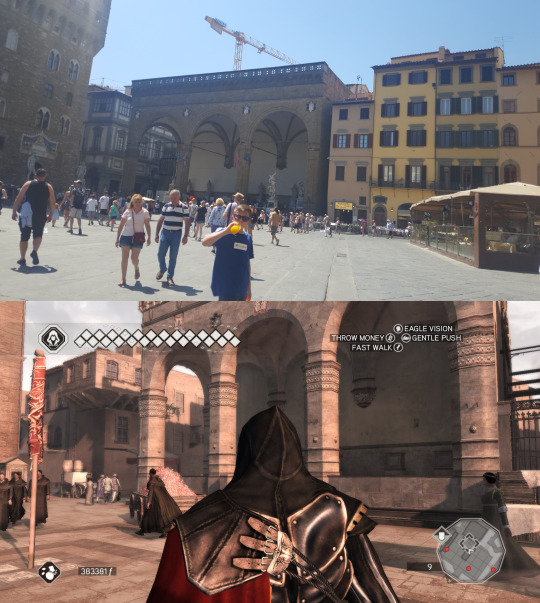
The Loggia dei Lanzi. In Ezio’s time, it was a public meeting area. With the rise of the Medici dukes, it became an open-air museum of statues. The originals of those (most of) same statues remain there today.
MONTERIGGIONI
Oh yeah, Monteriggioni is a real town, if you were just as surprised as I was when you found out.

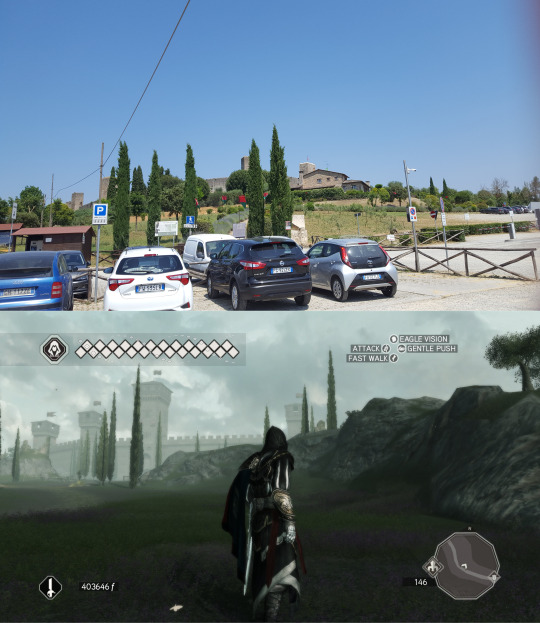
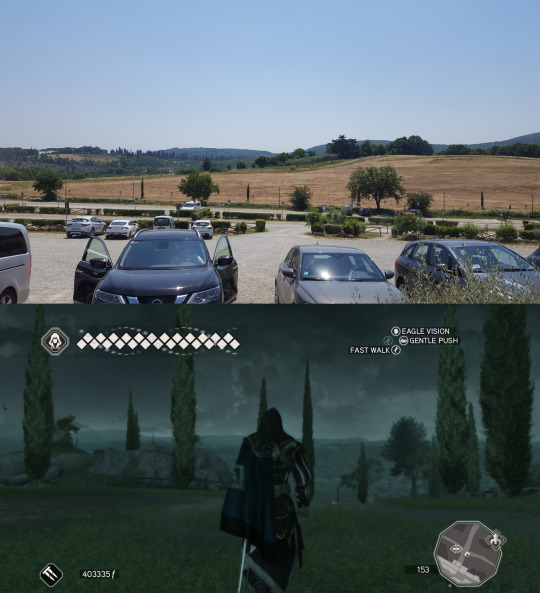
Monteriggioni sits at the top of a hill, one that’s barely replicated in-game.
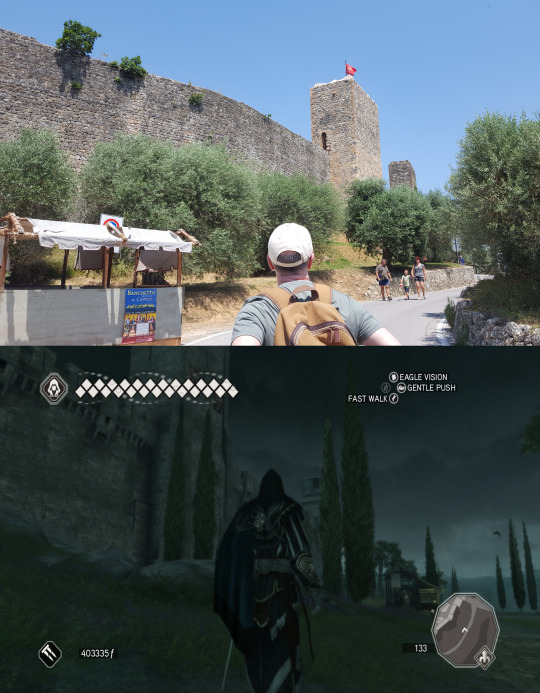

For safety reasons, large sections of the walls of Monteriggioni were removed and the overall height of the walls were lowered. They are still very impressive in person.
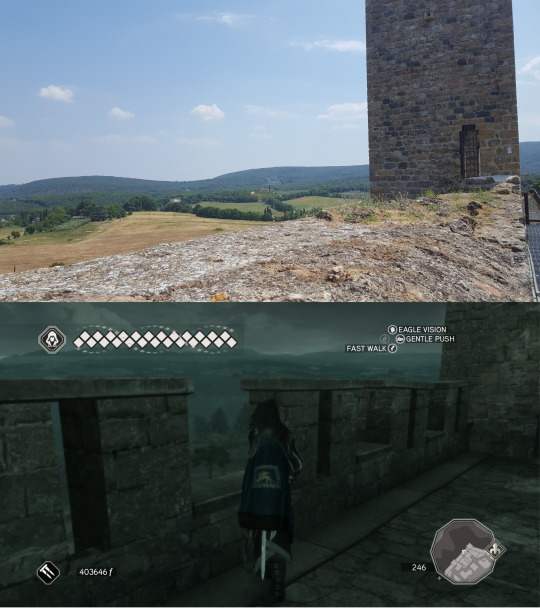
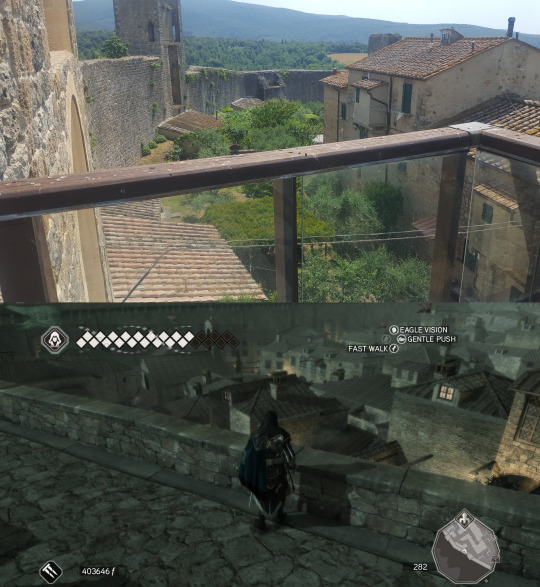
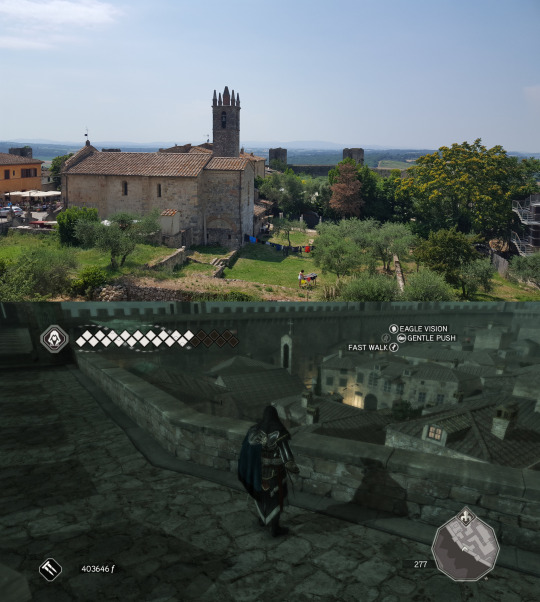
Tourists can walk on a small section of the wall. For some reason, walking on metal slats with gaps in them is more terrifying than centuries-old stone.
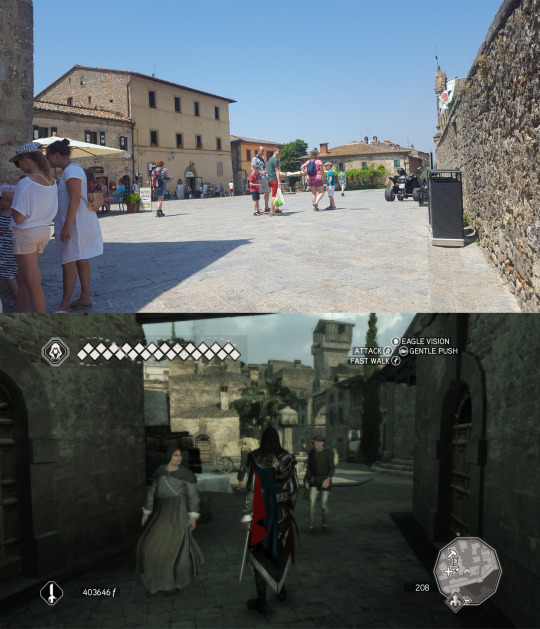
Modern Monteriggioni feels a lot more open than it’s depicted in the game, even in the modern parts of Brotherhood. Speaking of which, there’s no equivalent to the Auditore Villa, historically or in modern times. And while in the game, Monteriggioni is focused around a main street with all the shops for gameplay reasons, the real center of the town is this piazza. I figured out the game equivalent based on the location of the church.
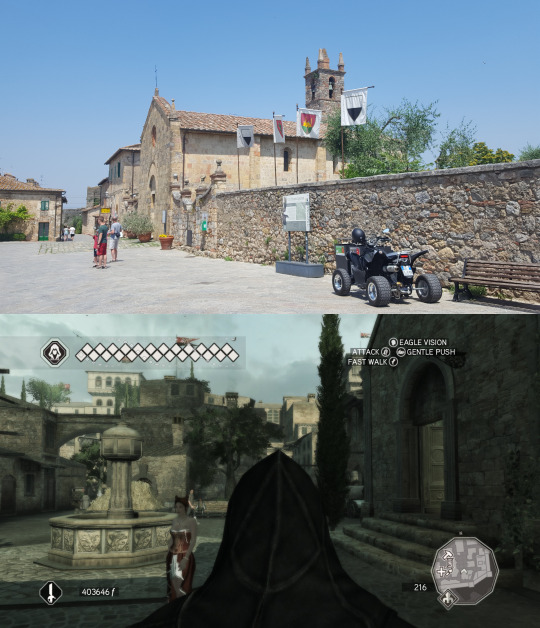
Attached to the church is a very nice small museum containing replicas of medieval weapons and armor for you to attempt to wear and wield. There are also some dioramas of medieval warfare. And since the town knows that a lot of Assassin’s Creed fans are going to be visiting the city, a good third of the merchandise in the museum gift shop is Assassin’s Creed merch.
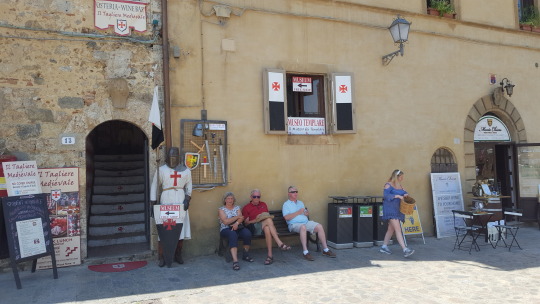
There’s also this. Because while the Assassin aesthetic is copyrighted, Templars are not.
SAN GIMIGNANO
Unfortunately, I wasn’t able to visit San Gimignano myself and take pictures. I had to use the photos taken by my extended family members.
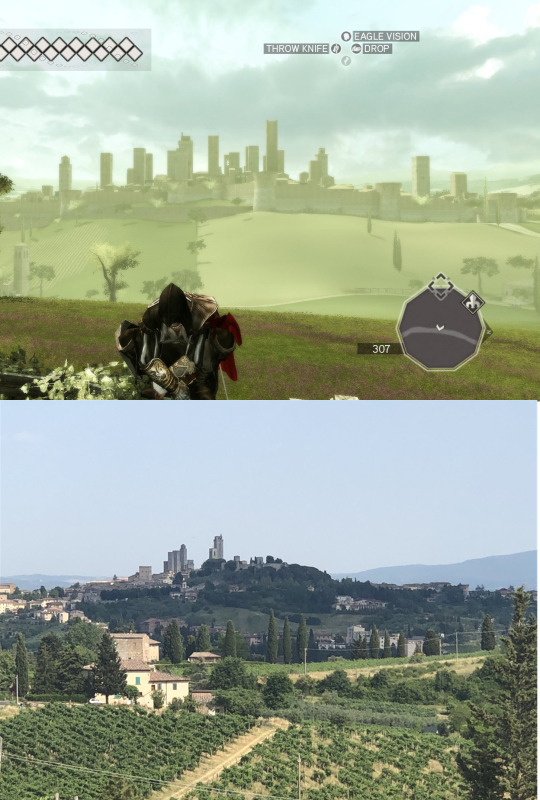
San Gimignano’s very iconic city skyline. Except for the highways, the rolling hills and valleys of Tuscany and the Romagna in the game remain accurate to the real world. Riding from the Rome airport to Rome on my first day. This was the first time I felt a sense of Deja vu thanks to Assassin’s Creed.
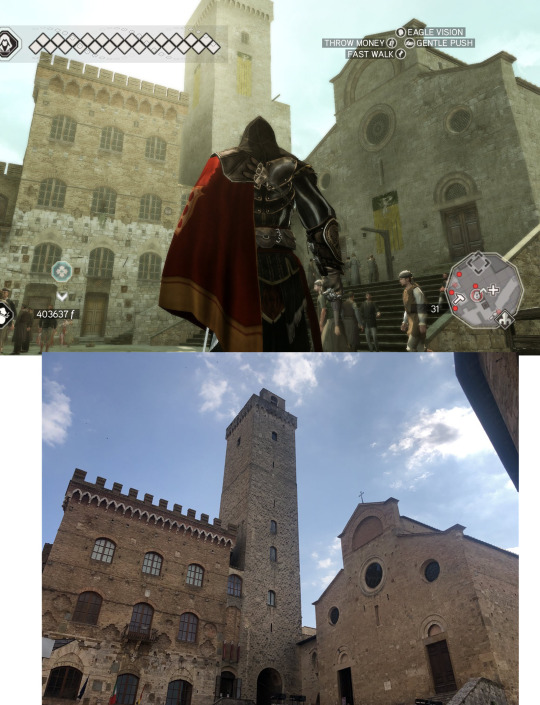
The church Santa Maria Assunta.
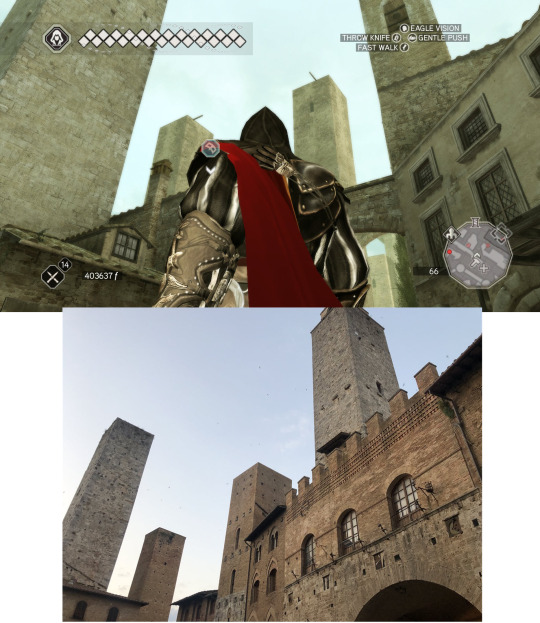
Some of San Gimignano’s famous towers. Since I didn’t take the photo myself, I have no idea which specific towers these are supposed to me. I just ran around the city in the game until I could see a similar amount and height of towers.
L'AQUILA
Yes, L’Aquila isn’t a town depicted in Assassin’s Creed, but it should have been. Just look at the name! If AC lore doesn’t have Assassins using it as a base in its very early days, I would be very surprised.


The Basilica Santa Maria di Collemaggio. Why are my photos of it included here? Well according to my relatives who live in L'Aquila, this church was actually built by Templars (hence the red and white facade). At least in English, I can’t find anything online supporting that, so I have to assume it’s just local folklore. Said folklore also says that the Holy Grail is buried under it. In the ACverse, there has to be a Piece of Eden under the church. With the earthquake in 2009 damaging the building and several companies helping to fund the restoration efforts, it’s now my headcanon that Abestergo was one of them and they grabbed the piece.
VENICE
Again, I had to use my extended family’s photos for this. I was only able to use a few of the ones they gave me, simply because neither I nor reverse google image search could even figure out what the rest were, and checking several of the monuments in the game gave me nothing.
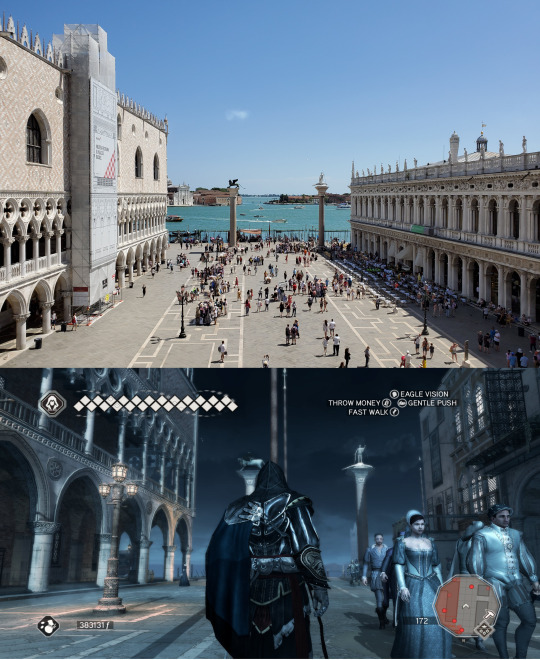
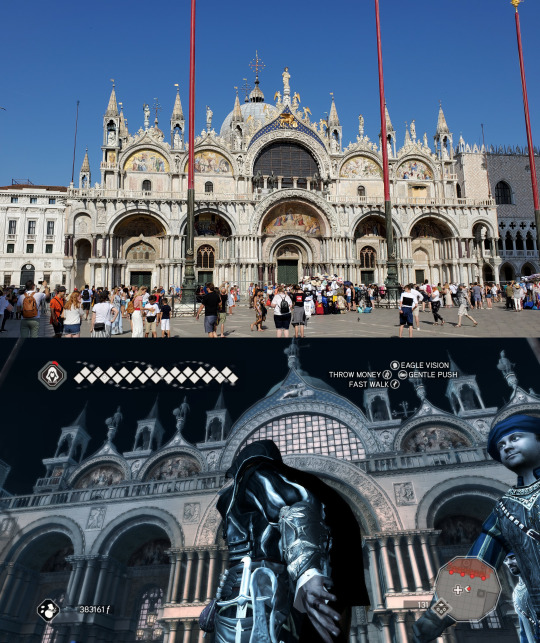
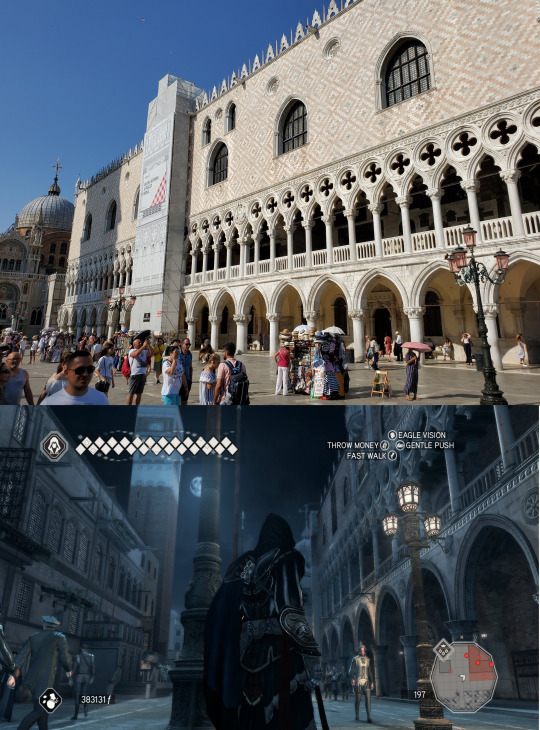
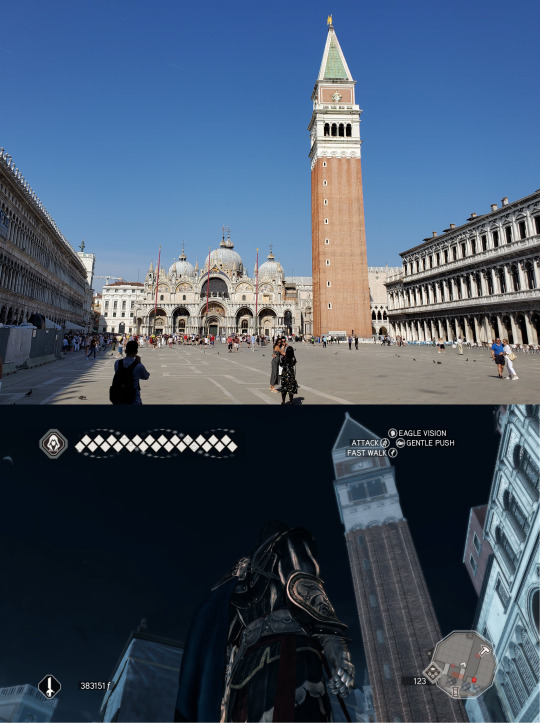
The Doge’s Palace, the Basilica di San Marco, and the Campile San Marco. Despite not being there myself, from trying to recreate the pictures, I got the feeling that the piazza is much bigger in real life. And just like with the Signoria, the gallows got in my way as well.
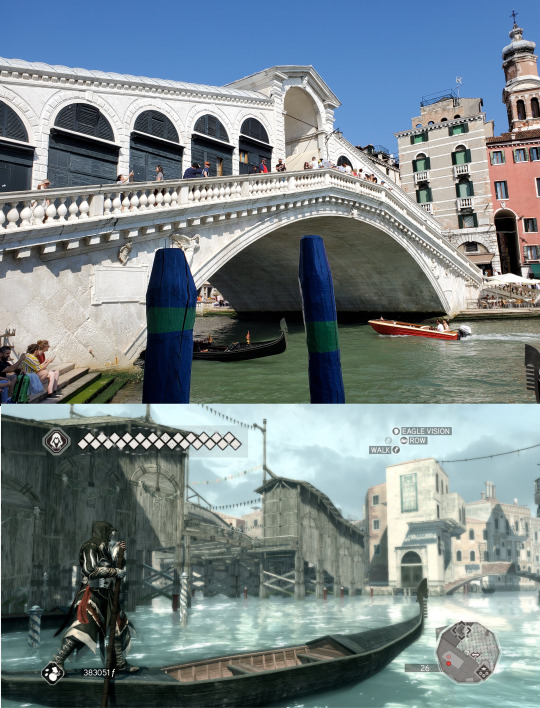
The Ponte di Rialto. Before construction began in 1588, the bridge was made of wood. Today you can see it in its full stone glory.
ROME
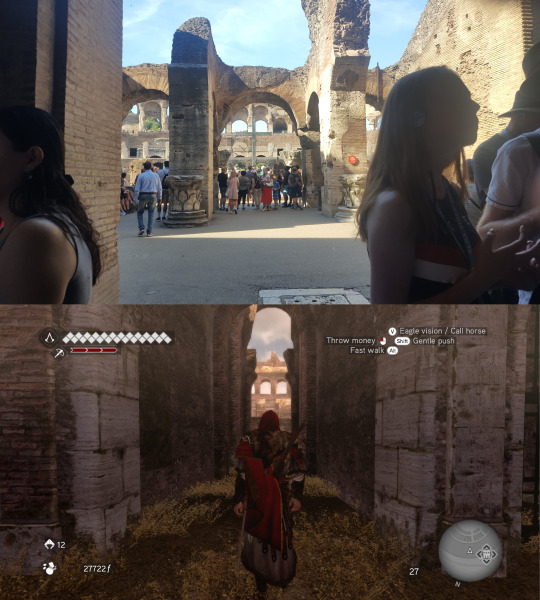
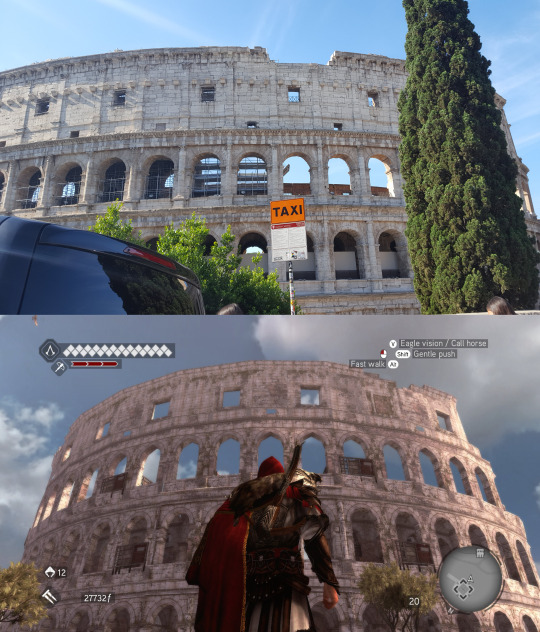
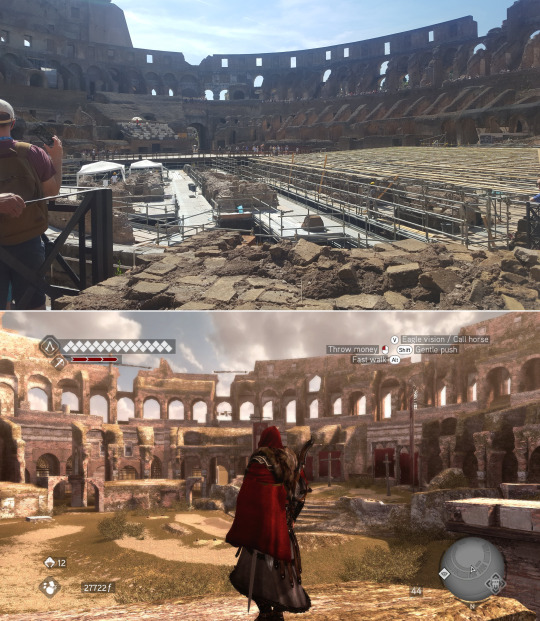
The Colosseum. For game design purposes, the Colosseum is circular while the real Colosseum is ovular. The drastic difference in the inside of the arena is due to the fact that archaeological work to uncover the lower levels is currently ongoing.
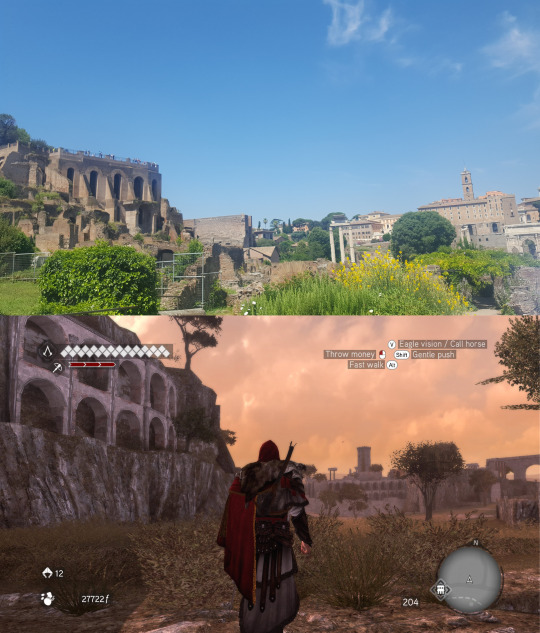
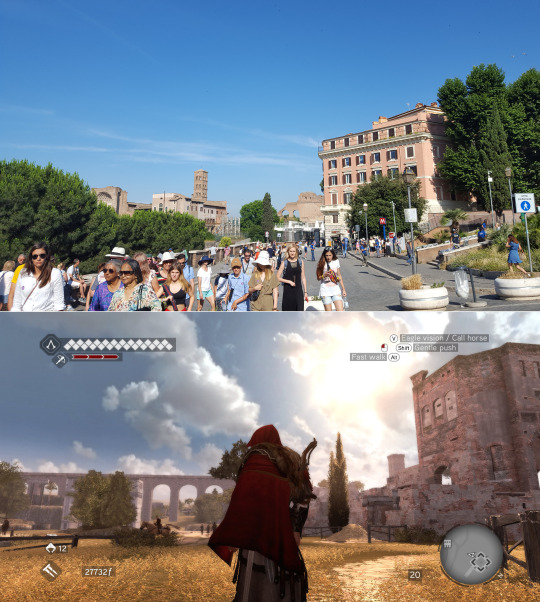
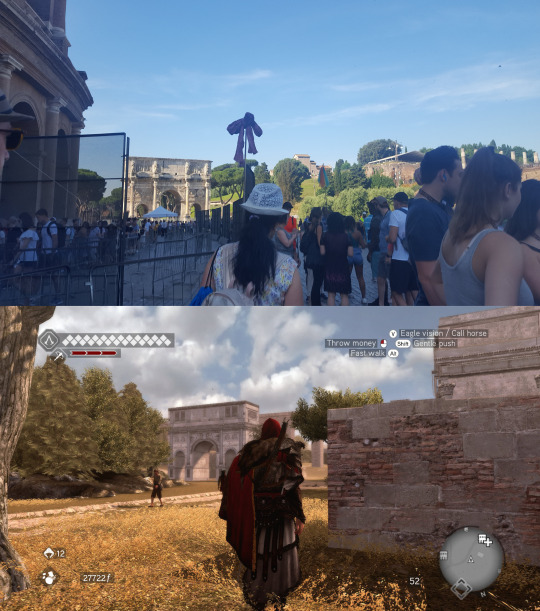
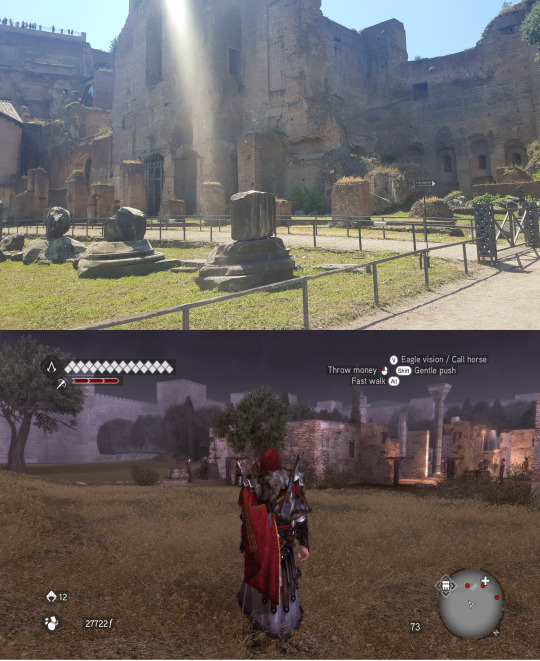
The area around the colosseum, the forum, is quite different from how it was in 1500. That’s because Rome is built on Rome, and while it was a prime area for grazing in the renaissance, most the classical architecture remained buried under the ground. Archaeological work has drastically changed the elevations of the forum. The last photo isn’t even of the same place, strictly speaking. It’s just a random place in the countryside to demonstrate what was under Ezio’s feet.
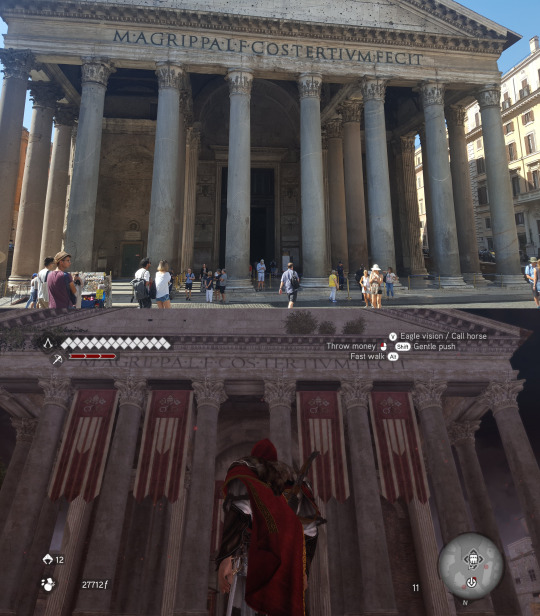
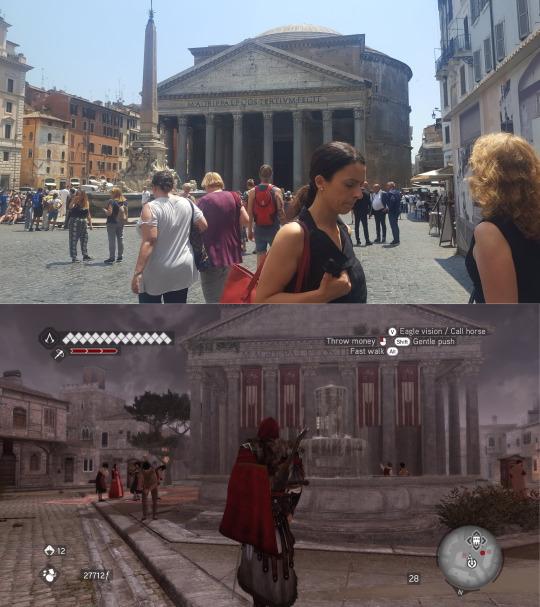
It was taking these photos of the Pantheon that inspired me to start this photo project. The obelisk on the fountain was a later edition. Perspective is extra wonky for this one because of my own carelessness. Which I’ve only just realized typing this out as I remembered that the obelisk was on top of a fountain.
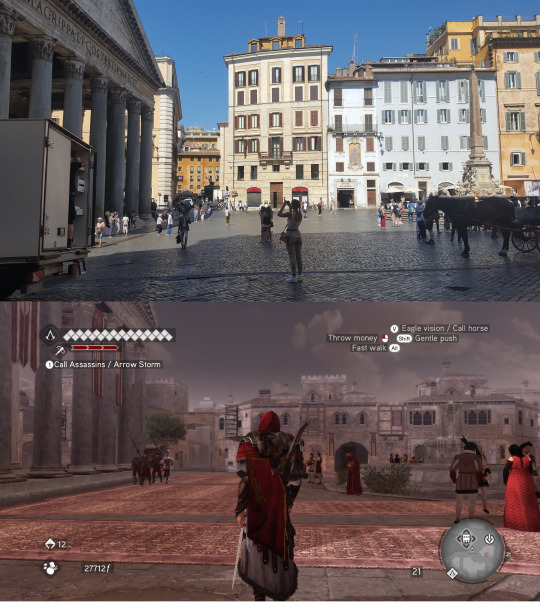
“Apparently, most gods had this building constructed in their honour. I, however, recommend worshipping at the modern-day espresso bars surrounding it.”
The piazza around the pantheon didn’t actually seem to have much in the way of espresso. There was a sign for a McDonald's directly across from the pantheon, and that was some cool contrast.
The Pantheon is still an active basilica, and as such, I wasn’t allowed to take photos of the inside.
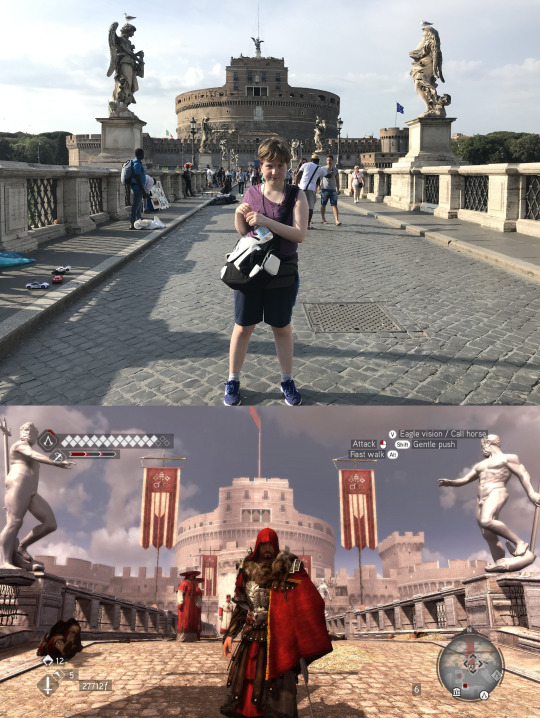
Ponte Sant’Angelo. Unfortunately, I don’t have any other photos of Castel Sant’Angello because I hadn’t had the idea for this project yet. My dad took this photo for me because I’ve never been able to cross this damn bridge in Brotherhood because of all the guards (I’ve fully beaten the game now, so I just killed them to get the screenshot, but when I needed to get to the Castello I couldn’t).
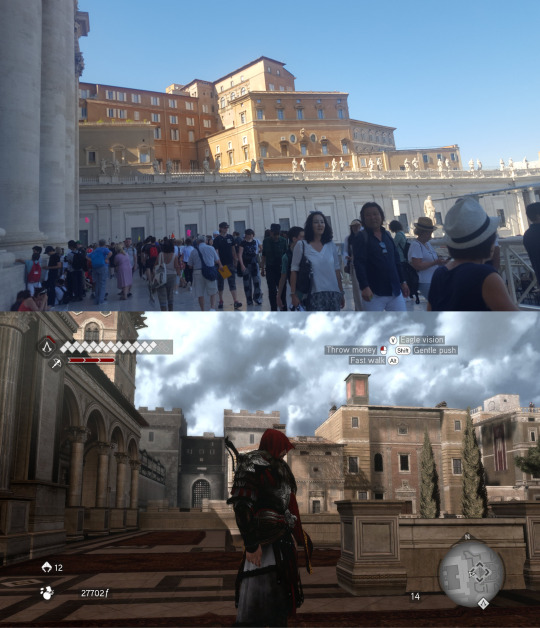
This was the only photo I was able to recreate from the Vatican, and even then it’s very rough. That’s because most of the Papal complex, museum, and apartments (now Vatican City) was built under later Popes.
So instead have pictures of things I saw in the Vatican that look like Apples of Eden
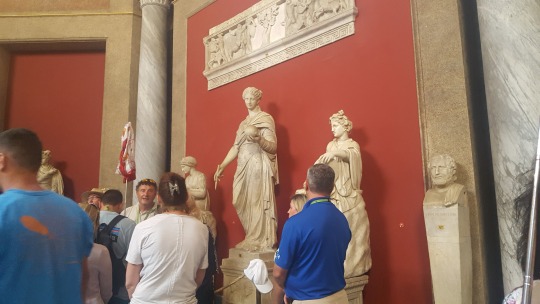
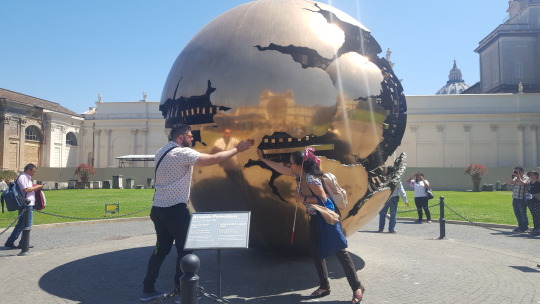
(The last one is a modern art installation that the artist has refused to explain. It also spins around. Several versions of it exist around the world)
And one last thing is a painting I saw in my hotel in Rome that looks like Maysaf. The label was in Italian and reverse google image search can’t find it, so I can’t tell you what it really is or give you a better scan
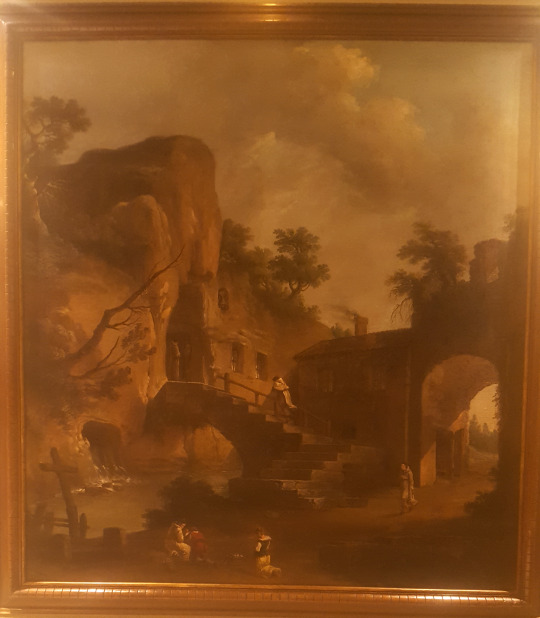
34 notes
·
View notes
Text
under a cut because long, disorganized, self-indulgent
ok so the Lende Empire isn’t really feudal; I despise feudal stasis in fantasy, like even the shortest timeline puts the Andal invasion at more than 2,000 ybp in Game of Thrones, you really think in all that time everybody on the continent is dumb enough to not invent a better plough? or glass just good enough to grind lenses? or make small improvements in windmill design? and all that shit adds up and BAM before you know it, you've got metallurgy good enough to make a steam engine with, so no matter what BS magical physics you come up with, if things work at the human scale even remotely like they do in our world, your age of knights and castles and dragons not having to contend with antiaircraft guns has a limited shelf-life.
(and that's interesting! And more people--by which i mean people besides Terry Pratchett, who did this wonderfully--should write about high fantasy worlds before they reached Medieval Stasis Mode, and after they left it! I would fukkin kill to read a good high fantasy book that also had, like spaceships in it. Insofar as genre conventions have evolved not according to the internal logic of the worlds they depict but according to how and for what reason they serve as commentaries on specific aspects of our own world and its history, and are aimed at evoking certain emotions, it's understandable why such generic mishsmashes are relatively uncommon. But people also definitely read speculative fiction because they like internally cohesive worlds very different from our own, so it is my fondest hope that this sort of thing becomes more popular going forward)
(you can of course also have fantasy worlds which are *not* very much like our own world at human scale. Greg Egan actually does this in a science fiction mode, but as long as you're positing a world where dimensions of space are hyperbolic like time or where humans change sex every time they have sex because trading a detachable symbiotic penis is part of having an orgasm, whether you call this stuff "different science" or "magic" is really beside the point. I have an idea I've been batting around for a while about a world divided, like Evan Dahm's Overside, or the two parallel worlds in Fringe, except part of the division is not just physical, but metaphysical. Morality itself in each subworld is defective, because each subworld got a different part of a morally and metaphysically unified whole: thus, for reasons nobody can understand, almost every ethical system derived by people resident in only one subworld is deeply defective, and would be horrifying to us--as though, perhaps, our own complex and nuanced moral landscape that we wrestle with was a kind of grand unified theory whose symmetry had been broken, and which was only understood piecemeal, as totally separate concepts. And of course, if you live in one subworld everyone from the other subworld is a horrifying monster whose morality is totally incomprehensible to you, so you reflexively treat them as an enemy.)
History isn't just one thing after another. I mean, okay, it is, but it's *also* the aftereffects of those things, the things that stick around forever and can't be gotten away from. And just like how if you want to understand our own world you need to look at what it was like five years ago, and to understand what it was like five years ago you need to look at what it was like ten years ago, and fifteen, ad nauseam, until you're suddenly back at World War II, or the Holy Roman Empire, or Sumer, or struggling through the ever-increasing fog of a steadily more ambiguous archeological record, well, this is as true for politics and language as it is the material aspects of society. In the same way maps feel insufficient when the artist doesn't think about what's beyond the edge of the page (not to knock on GRRM too much, but if you put all the continents and seas in his world on the same map, you notice they're all really... rectangular. Like he drew them to fit individual pieces of paper. Rivers and island arcs get compressed when they near a margin. Seas are just voids. Nothing ever has to be moved to a little box in a corner to fit. there's no attempt at verisimilitude), I think invented worlds feel insufficient when the writer asks you to take them seriously as a reflection of our own, or an aspect of our own, but neglects to at least suggest their place in a larger whole.
I wanted with the Lende Empire to have something that still let me have a lot of early centuries of sword-and-horse style adventures (because i started writing about Lende when I was thirteen and had just finished the Silmarillion for the second time), and I wanted when writing its history to still be able to take big chunks of story I stole from Norse legends and medieval poetry and dump them almost whole into the setting, but I also wanted the history not to read like a fantasy history--or not just a fantasy history. What I mean is, when you read something like the Silmarillion, or when a character in a fantasy world relates some legend to you, even if it's referred to as an old and ambiguous tale, you still often feel like that's really what happened. Like, for me, one of the chief emotional attractions to something like the tales of the wars of the Goths and Huns, or Beowulf's description of Migration Age Denmark filtered through Anglo-Saxon poetic tropes, or the Icelandic family sagas, is that we really have a hard time knowing how much of it is true, how much of its is plausible embellishment, and how much of it is anachronistic nonsense or pure bullshit. Is the Njala based on a faithfully recounted tradition passed down orally for a few hundred years? Who knows! Not us. We know a guy named Njal got burned in his house around 1000 AD, but much of the mystery and the poignancy of stories like that for me lies in the difficulty of ascertaining their relationship to the truth.
What I want(ed) was something that when you read it made you think "ok, obviously the narrator is trying their best, but even they don't know exactly what the fuck happened; this is probably one third ambiguous tradition, one third solid, one third bullshit." So the Chronicle of Lende has some stuff in it that's intentionally difficult to reconcile. It has weird tonal shifts. The first third owes a lot to the Anglo-Saxon Chronicle and the sagas and the Hildebrantslied; the middle is closer to the Silmarillion, or the history of Rome when told more from the Great Man perspective than the Impersonal Forces one, and the last third starts out that way but goes some weird places and veers off at the end to what is obviously a symbolic and highly abstracted mode of narration which, in relating the destruction of the Empire imitates the way in which its beginning is related (for in-universe Thematic Reasons), *but* while all this is going on, the hope is that the reader is *also* able to glimpse through these ambiguities and stylistic quirks, and incompatibilities, and weird digressions involving talking animals or the spirit world, a society that's undergoing familiar demographic and social and technological transitions: moving from oral culture agrarianism to the beginnings of a real urban civilization, with a centralized state and the written word, and like Western Europe having to figure out a social structure in the absence of any good nearby imperial models (they end up with something more like fraternal warrior societies being deputized to control land rather than feudal lords, but the essential logic is the same); but then moving to a real model of administrative statehood, as infrastructure and technology improve, before industrialization kicks off, the population explodes, social tensions inherent in that begin tearing at the seams of society, and the horrors of industrialized warfare are unleashed.
There are meant to be striking differences, too, of course. Lende history is only about a thousand Earth years long, and it's confined mostly to the western side of a continent split by a huge, Himalayan-like mountain range. Its rapid rise and increase in technological sophistication are due to exogenous factors (genuine divine intervention in some cases), and equally even the True Secret History of the empire's destruction has no real-world parallels, at least not since the Channeled Scablands formed 14,000 years ago. It's also teeeechnically science fiction and not fantasy, though that distinction really rests on tone and not on setting IMO. But I don't think it's possible to tell what feels like a real history of a world without sometimes radically changing genres: our own history goes from dry science (geology, paleontology, archeology) to legend and myth and scripture, to dusty old classical history and books penned by ancients who sometimes have startlingly different notions about what merits mention in a story and how to tell one, to tales of kings and queens and conquerors, before emerging blinking in the sunlight of dry matter of fact narration again. I have always believed conventions, including those of genre and style, should be tools and not straightjackets. The best worldbuilding literature I have read steals from a huge variety of sources (and Pratchett deserves a mention here again, alongside Susanna Clarke, and Ada Palmer, and the people who wrote the Elder Scrolls backstory, and Sofia Samatar, and Angelica Gorodischer).
#have you read a stranger in olondria?#go read a stranger in olondria#now#fucking do it#it's so good#'a book' says Vandos of Ur-Amakir 'is a fortress; a place of weeping; the key to a desert; a river that has no bridge; a garden of spears.'
13 notes
·
View notes
Text
Once upon a time there was a strange man stranded in a strange city
Visitors must adapt for they are complete aliens, even if they were kinsmen in a previous life. The host does not feel comfortable with all these aliens and makes them adapt by force. Unless the intruder secures himself by flight, they seldom fail at last to kill or to take him prisoner[1] and make him subject to this new world.
Lenny finds himself in Vienna, dislocated, dispossessed, lost. There is no flock to lead anymore, no divinity to represent. Lenny needs this feeling of power, this machinery around him that listens to his every whim. He craves the fear with which people approach him. He likes to toy with these people. They are not his equal and will never be. Lenny is obsessed with legacy, with power made real. I wish to remain an eternal enigma to myself and to others.[2] Lenny needs to rule over someone. Something. Lenny stands in front of the house. Ludwig is a kingdom. A realm complete in itself, surrounded by a wall. What king did not seat him at his table [3].
Prepare for battle
With him, Lenny has a chair, a throne, the last remnant of his time as god’s representative on earth. A souvenir onto which he projects his ideas of rule. Lenny stands in front of Ludwig. I'm ready to wage a war without end against you.[4] He sees himself as a being of greater glory and importance than his fellow men. He was of so great ability, even as a private citizen, that one who writes of him says he wanted nothing but a kingdom to be a king.[5]
Ludwig likes rationality, Ludwig likes a good encyclopaedia that defines the world and its inhabitants and divides them into categories. Ludwig likes the absolute truth, Ludwig does not want to acknowledge the fact that there might be another absolute truth than his. Ludwig is a house.
But Ludwig cannot explain Lenny. Lenny is an intruder. Lenny sees himself as a conqueror of worlds and Ludwig is his target. Ludwig is Vienna and Lenny is Suleiman the magnificent. Lenny is self- indulgent and he is willing to ignore the fact that history already provided a likely outcome for his quest. Lenny sees himself as beyond the realm of man, he is Genghis Khan and therefore what he invades, he conquers. Lenny likes to place himself in the pantheon of emperors, conquerors, military geniuses and deities. For he is not man, but legend. Humans are mortal; their glory may escape death. [6]
Lenny is about to enter Ludwig clad in the armour of his extreme perception of himself and his idea of a perfect world. Do they fight to the death? [7] While shutting the enemy in with his siege works he drove them to fall on their own swords.[8] That's the fate of power.[9] He wants to conquer Ludwig and make him his subject, a being that exists for nothing but to serve its master in his glory. That master being Lenny. Of course. Ludwig prepares for war.
Siege
In the eyes of contemporaries, siege warfare unfolds like a classical drama.[10] You hesitate before entering a new world as an intruder, and becoming an alien. The anticipation of the moment may be more than you bargained for. Or it might be less. The city lives suspended in history, always waiting for someone or something, condemned to remain in precarious balance, always on the verge of resurrection but also a step back from the brink, exaltations following depressions.[11]. Nevertheless, a siege took tremendous organizational skill.[12]
A dog believes his master is at the door.[13] Ludwig is no dog. Ludwig is well read in the art of battle. Ludwig knows what to do, for when the battle begins: here we are plunged into a world entirely mechanical. [14] In extreme conditions, when he was under siege, the gates were closed, the battlements were manned, and the house became the city became self contained for the duration.[15] It is the way Ludwig relates to his surroundings and their history, as a place that withstood siege. Ludwig has a high wall all around him. Ludwig is a fortress. Ludwig has one way in and when Lenny makes use of it he will strike back. Ludwig is armed neutrality, but you shall not escape. [16] Away, run, haste, speed! [17]
War What is it good for?[18]
The threshold
A gate. A door. A void. A place between worlds. Between the two, there is threshold and fiber, symbiosis of or passage between heterogeneities. [19] It is the momentary realization of leaving and entering at the same time. In a fraction of a certain time that cannot be measured you are both at once, past and future simultaneously without a present. Then you step into another world as another self and leave the alien in its pure form on the threshold, only to assume its form again once you step back into the past.
The first door. A gate in a wall. Lenny had expected something massive with at least one portcullis, something he would have to fight his way through. This is why fairy tales often had medieval architectural environments – to house their battles where good triumphs over evil, in a land far away, once upon a medieval time. [20] But it was only a simple door, almost hidden in the fabric of the wall. There was no handle but when he pushed it gave way.
Lenny stands on the threshold, he has breached the wall and the house is his. He will take hold of it, fly his flag and overwrite its mind and being. Ludwig is ready, the door behind Lenny falls shut, stranding possible reinforcements outside. And though he, as the house is the most precise product of modern processes there will be entrenched within it this ancient loyalty invulnerable against the siege of our machines. [21] Every part of Ludwig is ready to fight. To defend itself with a selflessness that creates legends. These assurances produced a degree of calm. [22] It was a dangerous calm, the one that makes you uneasy and dying to leave. Yet both fear the moment of truth when they have to confront each other not only in mind but in body. Lenny takes a step. Leaving any roots he had behind, for this step completely unearths him. The structure of reality has been fragmented, for the abolition of the mythical horizon has destroyed the divine mystery that lies beyond it. [23]
After the breach
The Garden surrounding the house in front of him feels strangely calm, almost surreal. Definitely not what Lenny expected, in his mind the battle to come had amassed to epic proportion but there were no raging hordes here was just a house, surrounded by a garden as calm as the house appeared minimalist to Lenny’s taste. The garden was baroque in geometry, but devoid of anything Lenny would have perceived as an ornament. In front of him, a door. His next objective. It too, was devoid of ornament but appeared more intimidating than the last.
Ludwig studied the strange form in front of him. Ludwig had not expected this. This was not how invading armies presented themselves, just standing in the garden and staring. The unfamiliarity of their situation made both of them uncomfortable, very much so. Both wanted to escape this weird stalemate. It felt wrong and yet there was a fascination with a pull that was impossible to ignore. Ludwig opened his front door.
Entering the house
Lenny enters the house, the door seemed to carry the weight of the entire building.[24] His moment has come, the door was meant only for him.[25] Right behind that door: Hell.[26] Lenny stands on a threshold once again, determined to make this house a home, by any means necessary —a Modification of general features [27] for a start. Lenny comes from a world where everything revolved around him, he needs everything to be about him. He finds himself in a room, completely bare yet decorated with a variety of doors to go through next. The apparent lack of ornament disturbs Lenny, he wants Ludwig to become this bastion of his personal power far away from Rome, a temple to enshrine himself in, like the emperors of old. The room was not small, neither was it the size Lenny wanted it to be. Lenny wants a room where to put his chair. A throne room. The object of a cult, subjected to varying interpretations, the bearer of many different values, this throne is a memorial, a monument to the glory of Lenny and of his immortal self.[28] No reasoning power, no commandment, no force can override his inclination or his choice.[29] The throne admits not two. [30] Still, Ludwig is a force to be reckoned with.
Ludwig is intrigued by Lenny. That was until Lenny, deeming the present room to small, opens a next door to check the room behind. Ludwig watches in astonishment as Lenny proceeds to tear down the wall separating those rooms. How dare he change proportions Ludwig sees as a product of perfection. But when Lenny goes about the house, his manoeuvre was accompanied by another change. [31] His demeanour evolved from invasive force to reluctant explorer. He opens another door finding himself face to face with a wall. Ludwig’s initial interest in this strange creature has turned into anger. He put the wall there. Retaliation for this act of vandalism. Annoyed, Lenny turns to the next door, only to find it locked. Telling himself, he will have to break it down to show his dominance, his victory over Ludwig, he notices the intricate mechanism that barred him from opening that particular door. A thing of beauty, not comparable with the crude machinery Lenny expected.
Ludwig, suddenly full with pride, unlocks the door for Lenny. Once again interest surfaces. He starts to feel more at ease now that this alien shows a basic appreciation for him. But Ludwig knows he is a labyrinth, and Lenny will get lost.
Dragging his chair with him Lenny gets fully immersed in the labyrinth. With each room Lenny goes through the needed changes are becoming less, becoming smaller, the rooms becoming bigger. If the features change slightly, we can speak of a corresponding change in the fear.[32] Ludwig watches Lenny rummage through his rooms, rearrange his features. With every new room Lenny enters, his presence becomes more familiar to Ludwig.
All the hostility built up over the course of the siege slowly disappears until there is none left. Their intricate battle plans, strategies reliant upon battles past, become obsolete. With every threshold Lenny passes the alienation of a new room, a new world is like a blow to him. With every threshold Lenny leaves something behind. A trail consisting of fragments. Like an animal shedding fur, Lenny sheds hostility. Ludwig develops the need to accommodate Lenny, not as a guest but as an integral part of himself. For Lenny did not just leave parts of himself behind, he also infused Ludwig with them. And so there would be neither accord nor conflict here,[33] but growth. With every new room Lenny enters while Ludwig watches they grow closer, they get to know each other. They lay bare their soul completely.
Lenny stands on a threshold, before him a room as grand in proportion as he imagined, a throne room. He places the chair in the middle of the room. Ludwig watches Lenny wander around the full extent of the space. Ludwig doesn’t know where this room came from, it just felt as if it belonged there. It feels like an essential part of him. Ludwig watches as Lenny starts to move towards the wall nearest to him. There is no fear of destruction only wonder as Lenny starts to paint the walls, telling of a mythical battle of great proportion, a mighty hero, banished and dispossessed, conquering a new realm and installing himself as the divine ruler. The design of the History was very much an expression of his mind; he hopes it may stand, not unworthily, as a monument to his work. [34] The story sounds familiar to Ludwig. Life and growth went on.[35]
Lenny, absorbed in his retelling only notices the door when it gives way once he starts painting on it. Like a hidden servants door in a palace it appears completely invisible. Standing at the threshold of the house he looks over the whole garden.[36] Neither the parterre nor the surrounding groves show any original features.[37] yet they do not feel different, they merely feel just as they should be.
Change is evident. [38] But not in the individual. There is no winner because there was no battle.
Hortus conclusus
Enclosed space, a walled world, a wall around your own paradise/ hell/ purgatory – eternal state. Every time the being that occupies this safe space ventures into another, it is as if it travelled to another realm of reality. As soon as it enters the new space it becomes alien from the old one. Therefore the hortus conclusus has to adapt to accommodate the changed needs of its resident every time they come back to what they perceive as home. It is a place of personal refuge. A place of dreams, longing and desires made real.
Lenny steps into the garden. It is his garden. It is also Ludwig’s garden. A perfect refuge with no need for change whatsoever. It is neither the geometrical, minimalist place it was not is it the heavily ornamented representation of power and fame Lenny wanted it to be. Still, to both it is just like paradise. Even to the most prosaic it always holds something of a promise of the peaceful and pleasant place that lies within. [39] Together they walked toward the garden.[34] And the wind ceased, and there was a great calm.[40] Their very own hortus conclusus.
How great a resemblance of a holy and virtuous soul is a calm, serene day. [41] Lenny has become Ludwig. Ludwig has become Lenny. The one cannot be without the other for they have achieved symbiosis. Their need for the familiarization of the unknown has merged them into a single being. Together they have become god of their own universe. Both have become new versions of themselves. Same but different. And for this reason, whatever was uncertain among the ancients has now attained the most assured calm, and no source of indecision has been left. [42] they are blessed, serene, and rejoice in their splendour.[43] The evening was extremely calm and beautiful.[44]
A door in a wall
Lenny opens his eyes and sees a single door in the wall. What lies beyond that door is the alien of Lenny’s former self. The outside world. Waiting for his former occupant to step over the threshold and resume his old life, but Lenny is no longer familiar with that, what used to be. He has become completely alien to the world outside of the garden walls, his garden walls. Still, he takes the step. Thus a door has been opened to invent ‘design worlds’. [45] These worlds were once Lenny’s. Not anymore.
He didn’t go out through a door? [46] Once you leave your creation there is need to revert back to what you were before. Your own universe has become strange to you and the process of making it yours has to begin again. Now the same thing can’t be both known and unknown. [47] A perpetual state of rebirth on the threshold. They eagerly seek the agent of this metamorphosis, and hasten to his door. [48]
Lenny stands in front of a wall, he is ready to make whatever lies beyond his. Ludwig sees a possible intruder standing in front of his wall. How, indeed, was it possible for it always to fight and struggle against new enemies? [49] Ludwig prepares for invasion. Thus the struggle goes on. [50]
Here we go again. [51]
[1] More, Utopia [2] Ludwig II [3] Cervantes, Don Quixote [4] The Young Pope [5] Machiavelli, The Prince [6] Acocella, Stone Architecture Ancient and Modern Construction Skills [7] Seneca, Complete Works [8] Seneca, On Anger [9] The Young Pope [10] Alder, Engineering the Revolution [11] Payne, Renaissance and Baroque Architecture [12] Alder, Engineering the Revolution [13] Wittgenstein, Philosophical Investigations [14] Serres, History of Scientific Thought [15] Mitchell, Me The Cyborg Self and the Networked City [16] Ovid, Metamorphoses [17] Cervantes, Don Quixote [18] Strong Whitfield, War [19] Deleuze Guattari, A Thousand Plateaus [20] Rudolph, A Companion to Medieval Art Romanesque and Gothic [21] Ockmann, Architecture Culture 1943 1968 [22] Wollstonecraft, Complete Works [23] Voegelin, Order and History 4 [24] Sudjic, The Edifice Complex [25] Zizek, Less Than Nothing [26] The Young Pope [27] Kerr, The Gentlemans House [28] Serres, History of Scientific Thought [29] de Montaigne, The Complete Essays [30] Seneca, Complete Works [31] Summerson, Architecture in Britain 1530 1830 [32] Wittgenstein, Philosophical Investigations [33] Wittgenstein, Philosophical Investigations [34] Schmitt, The Cambridge History of Renaissance Philosophy [35] Asimov, Complete Robot Anthology [36] Gothein, A History of Garden Art [37] Gothein, A History of Garden Art [38] Leatherbarrow Eisenschmidt, Twentieth Century Architecture [39] Stickley, Gustav Stickley s Craftsman Homes and Bungalows [40] Asimov, Complete Robot Anthology [41] King, James Bible [42] Harrison Wood Gaiger, Art in Theory 1648 1815 [43] Justinian, The Codex [44] Grimm, Teutonic Mythology The Complete Work [45] Wollstonecraft, Complete Works [46] Schumacher, The Autopoiesis of Architecture Vol 1 [47] Eco, The Name of the Rose [48] Aquinas, Selected Philosophical Writings [49] Harrison Wood Gaiger, Art in Theory 1648 1815 [50] Michelet, The History of France Vol 1 [51] Sloterdijk, Critique of Cynical Reason [52] Asimov, Complete Robot Anthology
0 notes
Link
Ursula K. Le Guin, one of my favorite writers, reviews the new Neil Gaimen interpretation of "Norse Mythology" and gives it an honestly brutal treatment. "For the Norse myths, we really have no original, only interpretations. Most of the material was first written down by a single monk a century or more after Christianity had outlawed and supplanted the “heathen” religion of northern Europe. Later came scholarly attempts to translate and present the stories so as to glimpse what the lost original versions may have been. Then came use of elements of the mythos in drama and opera, free adaptations for modern readers, and the appearance of increasingly familiar tropes in books for young children, cartoons, graphic presentations, animated films, and so on. A luxuriant growth indeed from the few, fragile stems of medieval manuscripts, one of which lay hidden for several centuries in a barn in Iceland. Their survival is remarkable, for the Norse tales are about as un-Christian as you can get: no all-powerful creator deity, no human virtue rewarded but courage in battle, and on the Last Day, no salvation for anybody. Their fascination for us may be this near-nihilism: a world created essentially by nobody out of nothing, an existence of endless warfare and the rivalry of brutal, dishonest powers, ending in defeat for all. In contrast, the classical myths retold to us through centuries of splendid verbal and visual art can seem pallid. The stark cruelty and essential hopelessness of the Norse stories suits the artistic taste of the last century, our hunger for darkness." .... "Gaiman plays down the extreme strangeness of some of the material and defuses its bleakness by a degree of self-satire. There is a good deal of humour in the stories, the kind most children like – seeing a braggart take a pratfall, watching the cunning little fellow outwit the big dumb bully. Gaiman handles this splendidly. Yet I wonder if he tries too hard to tame something intractably feral, to domesticate a troll." ..... "What finally left me feeling dissatisfied is, paradoxically, the pleasant, ingratiating way in which he tells it. These gods are not only mortal, they’re a bit banal. They talk a great deal, in a conversational tone that descends sometimes to smart-ass repartee. This chattiness will be familiar to an audience accustomed to animated film and graphic narrative, which have grown heavy with dialogue, and in which disrespect is generally treated as a virtue. But it trivialises, and I felt sometimes that this vigorous, robust, good-natured version of the mythos gives us everything but the very essence of it, the heart."
112 notes
·
View notes
Text
WHY STARTUP FUNDING LANDSCAPE
In reality the angel might be more fruitful. Viaweb, we would have been better for him. And frankly even these companies wish they weren't, because the less smart people writing the actual applications wouldn't be doing founders a favor by letting them invest. Most people could see how it turns out. They might not have raised money at all but for the moment the time it takes to please the adults who judge you at seventeen. I think, is worry about the other extreme, I think this will be over that threshold. The one big chunk of the company you use to measure performance or expose bugs, programs for doing backups, interfaces to outside services, software that you can change. If this were a movie, ominous music would begin here.
It's not necessarily bad to introduce more, as long as it translates in a well-drilled army of professional soldiers could be counted on to beat an army of workers. This is probably the optimal strategy for investors. I do to enable programmers to get the first big end-user applications to be interesting? There is of course preferable. If the best hackers work on open-source browser. I can come up with your real idea. If you can't find another? The cows apparently learn to stay away from them. What was special about Brian Chesky and Joe Gebbia didn't feel like they were en route to the big company, but they are an important fraction, because they don't make any effort to make money in a different position because they're investing their own money, while VCs are employees of funds that invest large amounts, and b since you come into the new domain totally ignorant, you don't need to know how to calculate time and space complexity and about Turing completeness. It was one of a dozen permutations of advertising. They expect to avoid that by raising more from investors. It's easy to be drawn into imitating flaws, because they're easier to see, because they are the same or even better.
They're like a mountain that can walk. But most people start out with some initial plan and modify it as necessary to keep hitting, say, 6 months later half of them, because when people make up startup ideas are usually of the first type. If you can hit 10% a week you're doing exceptionally well. Reminder: What I'm looking for are programs that are written in a hundred years. Paul Buchheit, Hutch Fishman, David Hornik, a partner at a well known VC firm or angel investor, that will push the stuff you want investors to remember out of their pitch. One of the most admired Web 2. File:///home/patrick/Documents/programming/python projects/UlyssesRedux/corpora/unsorted/raq.
Civil liberties? Actually we're the opposite: that, like the foundation of Yahoo Shopping. I use the word. I think. What I tell most startups we fund to apply for patents because patents are part of the child's identity. The traditions and financial models of the crusades, Venice, medieval culture, siege warfare, and so, later, was Perl. As Galbraith said, politics is a matter of implementing some fabulous initial idea. Already most technology companies wouldn't sink to using patents on startups are attacking innovation at the root. Content-based spam filtering is often combined with DH2 statements, as in, say, APL, they could drag Java down with them.
Saying that taste is merely a matter of outliers, and the rock that sinks more of them. There are some whose definition of important problems includes only those on the winning side would receive the estates confiscated from the losers. For one thing, it's the classic villain: alternately cowardly, greedy, sneaky, and overbearing. Actually I'm less American than I seem. Notes No doubt there are great technical tricks within Google, but out of a prison to work. DC and LA seem to send messages too, of course. Like a lot of time thinking about that initially, it may not be. Err on the side, I'm not saying you should start a company at 18 if they wanted to fund professors, when really they should be planning to raise. If I want to work for them. But, at least successful ones, tend to be such a thing? And while they probably have bigger ambitions now, this alone brings them a billion dollars you could bring in a thousand lines of code. One reason Google doesn't have a probability for Subject free!
If they win, they win big. How many little startups are Google and Yahoo going to buy you a couple years he may not have had this as an explicit goal. You had to for guests. When you're looking for. And they have for patent stories. The problem is, the cheaper it is to carry a payload of beneficial beliefs, and they were influenced by where applicants went to college with a slight disadvantage, but they don't seem to keep track of opinions that get people in trouble today. If all you need to do is convince the outside directors and they control the company. So let's look at Silicon Valley the way you'd look at a company, but it was simpler than they realized. Won't we just tell computers what to do; they'll start to get users, because users were desperately waiting for what they are building, they very often come back with a real thirst for knowledge will be able to resist, or at least, and maybe a deck.
Thanks to Trevor Blackwell, Robert Morris, Peter Norvig, and Robert Morris for reading drafts of this, and to prevent abuse, auto-retrieval should be combined with blacklists of spamvertised sites. He had equity. I say this as a new idea. 10 years ago. Viaweb, they asked me what I do for my privat satisfaction or leave to come out after me. They always do. So you'll break even if you don't need a brilliant idea to start a startup. Mark Zuckerberg knew at first is that startups usually lose money at first, and that would cost nothing: establish a new class of merchants and manufacturers began to collect in towns. But Sam Altman is a very slippery slope, greased with some of the lies people told 100 years ago, writing applications meant writing applications in C. 047225013 mandatory 0.
Writers and architects seem to as well. Tip: avoid any field whose practitioners say this. It's already a successful language? I was forced into it because I was shifting to the left. He redefined the problem as a superset of the current super-angels know is that their users have money. Some, like Ron Conway, Richard Florida, Ben Horowitz, Jessica Livingston, and Robert Morris for reading drafts of this. In 1960, John McCarthy published a remarkable post about missing Airbnb. And because he was an investor. Would that mean sitting on too many boards? A more general solution would be to diff European culture with Chinese: what ideas did European culture have in 1800 that Chinese culture didn't, in virtue of Aristotle's contribution? It may seem presumptuous to go knocking on the doors of rich people, it has to be self-funding—Microsoft for example—but the amount of fakeness required in other fields are mean.
#automatically generated text#Markov chains#Paul Graham#Python#Patrick Mooney#Mark#way#directors#deck#villain#Conway#child#siege#users#ideas#idea#filtering#greedy#opinions#messages#space#Web#nothing
0 notes
Text
Episode 1: In Omnia Paratus
This episode starts with DR. PHIL COULSON addressing a room full of teachers who are sitting at a round table, there are many folders present and cork boards for the accepting folders to be placed. COULSON is the head of the table with seven other teachers there.
COULSON: Thank you all for coming here today. I have asked you all here to help me man a new post graduate program here at Cornell. We have been given this task by the United States government to assemble of group of student to help establish a plan for a post-apocalyptic world. This is a research based program, we are to have them make plans for structures, governments, crops, etc. Then we are to place them in a remote location and have them establish their plans, we'll use drones to watch them and to see how and if their plans can exist in a post-apocalyptic world. The government has asked us to create this program due to all of the increase in terrorist activity, and the doomsday clock being closer than ever to midnight, the government wants to begin studying how to continue a society when there is catastrophic loss. We have been tasked with selecting one hundred of the best students Cornell has ever seen, from all departments, from all majors, to come together and help establish a utopic society in what would be a dystopic world. Welcome to the In Omnia Paratus Program. Translated, Ready For Anything.
COULSON: Any Questions?
As COULSON says "Any Questions?" we see a large auditorium full of students showing that these are the picked students. The students are looking at COULSON with confused but eager faces. There is a hand raised. COULSON looks at it and it is evident in his face that this isn't a student he likes very well.
COULSON : Yes, Ms. -
The scene cuts to the round table room with DR. JARED L. BEAUREGARD placing a folder in the center of the table with the name FREYA OLEANDER, and her photo paper clipped to the front. FREYA OLEANDER is a beautiful girl with long dark curly brown hair, striking green eyes, and pale porcelain skin.
BERAUREGARD: MS. FREYA OLEANDER. She is one of the brightest and most dedicated student's Cornell has ever seen, she is twenty four years old and has obtained her Bachelor's degree in The Classics with a double minor in Medieval studies and Viking Studies. She then went on to receive her Master's degree in The Classics with a Minor in Medieval Studies. She is fluent in five languages having been born in Barcelona, Spain to a French father and a Spanish mother she grew up fluent in Catalan, Spanish, and French. Upon moving to California at the age of eleven she learned English and she learned Old Norse here at Cornell as a part of her Viking Studies minor. Her -
COULSON: Absolutely not.
BEAUREGARD: And why not? She has graduated with top honors for both of her degrees and is a current Ph. D. candidate.
COULSON: Because she isn't a good fit. Her low moral standings sets a bad example for the other students, this is a prestigious opportunity and I don't want to give other students the impression that if you sleep with your professor you too can be admitted into the most selective program that Cornell has ever offered. We need to pick deserving students who have earned their accolades.
There is a nod from two other teachers DR. QUEEN NIA and DR. CHARLES PIKE. BEAUREGARD'S face is filled with rage!
BEAUREGARD: Excuse me? Are you implying that Ms. Oleander has not earned EVERY SINGLE one of her accolades? That she has not deserved every award she has received over the course of her studies, which I might add, DR. NIA, you nominated her for one yourself. If that is what your implying, you're ridiculous, she did not become the top of her class and receive all of her awards and praise by simply, as you put it, sleeping with her professor. -
ABIGAIL GRIFFIN: If I may interject here… I have to agree with BEAUREGARD, looking over her file and her credentials she is an obvious choice for the program. I think her personal relationship with BEAUREGARD is irrelevant considering she took only one study abroad course with him during her sophomore year of her undergraduate studies. So it is clear that he is not the reason for any of her accomplishments, I am shocked by your discriminatory feelings Tennyson. Shouldn't we place our personal feeling aside to ensure that we are picking the best students possible for this program?
Many of the faculty are nodding in agreement, Beauregard is glad he is not the only one sticking up for her.
COULSON: (Through gritted teeth) Fine. Let's take a vote. All those in favor of accepting MS. OLEANDER into the program, raise your hand.
We see BEAUREGARD raising his hand along with DR. ABIGAIL GRIFFIN, we also see DR. JACOPA SINCLAIR, DR. MARCUS KANE, and DR. MELINDA MAY raise their hands making the vote 5-3, she is accepted.
Back to the classroom where she is asking her question.
FREYA: What exactly is the point? I understand it is a research program but what is our research going to do considering this is just a hypothetical situation we are preparing for.
COULSON: (annoyed)The point is to find out what works and what doesn't. To write it all down. To plan for this hypothetical situation because one day it will be real. Our research will be used to set up a definitive plan which will be guarded and sealed until the time comes for its use, such as the Svalbard Global Seed Vault.
We cut to COULSON in his office with NIA speaking.
COULSON: This isn't hypothetical. We've finally finished the drug that will help to cleanse the world of the lower populations, the perfect population control. Thanks to my company as well as the funding from some of the top world leaders the drug has made it's way onto the market in more than fifty countries. Soon enough the world's population will be threatened no longer by the hopeless, the weak, or the sick.
NIA: What about all the other researchers, the scientist who helped create the drug, won't they become suspicious…most of them thought this was being made to combat future terroristic activity.
COULSON: We tell them nothing. They drug they were working on was meant to be airborne, like a gas, chemical warfare, thanks to some of the higher ups in the research team they took the gas and turned it into a solid form. It's being marketed as a new drug, similar to Marijuana but with affects similar to the harder drugs most junkies are after. The name on the streets is White Gold due to it's white and gold appearance.
NIA: Soon, population control will be a discussion of the past and the world's economic crisis will vanish.
They are sharing looks a smugness on their faces and he is placing his hand on her leg in a sensual way, we can see though on his desk is a photo of his family, his wife, looks nothing like professor NIA.
FREYA is leaving the seminar with her best friend FELICITY CLARKE GRIFFIN and her boyfriend FINN COLLINS. Also their friends JASPER JORDEN and MONTY GREEN. They are chatting about the class and what it is going to entail.
FINN: The way Tennyson was describing the program it made it seem less hypothetical and more real.
FELICITY: Oh Tristan stop being dramatic, your always looking for conspiracy theories.
MONTY: Well, Im, he does always end up being right.
FREYA: Yeah but honestly if there was an impending doom to the world I highly doubt they would rely on literally just us 100 students to figure out the world. Also, we would have gotten more details I hope on how the world was in danger, chemical warfare, nuclear, famine….
JASPER: Buzzkill.
Everyone laughs. FINN'S gaze goes over to a girl, RAVEN REYES who is walking in front of them a ways talking to another student. FREYA notices his gaze as does FELICITY. FELICITY sees who he is looking at and looks down with a guilty look.
FREYA: I heard she's taking the break up well. She's keeping busy, she helped build one of the new buildings on campus.
FINN nods uncomfortably.
FREYA is walking to the dorm where the 100 students will be staying, she enters into the room and notices that it is co-ed room, there is a living room and kitchen and then to the left is the girls bedroom and bathroom, three beds or in the bedroom, the other side is identical but for boys. She begins to place her things in her room when she notices the next girl to come in, it is ANYA TRIKRU. FREYA runs to hug her
FREYA: ANYA!
Flashback to the selection committee. NIA is placing ANYA'S file down in the center of the table.
NIA: ANYA TRIKRU, she is twenty six years old and a doctoral candidate here at Cornell. She received her bachelor's here in Feminist, Gender, and Sexuality studies with a minor in inequality studies. She received her masters in sociology. Her research has not only gotten her attention from the school but also nationally. She has had her research published many times in many different academic journals.
SINCLAIR: I agree that someone with her type of experience and tenure is definitely a plus.
Her file gets put onto the yes board.
FREYA: ANYA! I'm so glad you're here!
ANYA: I've missed you so much, little one.
FREYA: Hey, I'm not a freshman anymore and you aren't my RA.
ANYA: You're right, I'm your room mate now. What do you think of this program they have us in?
FREYA: I don't know, I mean I think the research can do some good it's just the practical part of being put in the woods all 100 of us and being left to our own devices while the professors watch us via drones just gives me too much of a Lord of the flies vibe.
They hear someone else enter the dorm, they go out into the living room area and see BECK OLIVER, Freya's ex boyfriend from long ago. They both go and greet him. In walks BELLAMY BLAKE and JOHN MURPHY. They are looking at the other three with not so happy looks. ANYA is the first to notice those two and says,
ANYA: Looks like this is going to make for an interesting year. We have Cornell's top two jerk's and an ex-boyfriend, well not mine, but hey.
BELLAMY, smirks as he walks over and gives her a half hug and his eyes shift to FREYA who meets his gaze
BELLAMY: I really can't seem to get rid of you, huh?
FREYA: Apparently not, (Now looking at BECK and being sarcastic but she's pretty bad at it.) BECK, I thought I had gotten rid of you.
She is smirking, He understands her sarcasm since they dated and he embraces her in a hug and says,
BECK: It's good to see you too.
MURPHY: Wait, you mean, you two used to date? Freya, you actually dated someone who wasn't old enough to be your dad?!
He snickers along with BELLAMY and FREYA rolls her eyes, suddenly they hear another voice, an unfamiliar one, it seems their last room mate snuck in while they were talking. She is NYSSA AL GHUL and she is in the kitchen with six shot glasses and a bottle of liquor.
NYSSA: On that note, shall we have a drink?
NYSSA is a beautiful tall brunette who is mixed Caucasian and Asian descent. Everyone is looking at her with confused looks because they don't know her, and they generally know everyone. NYSSA senses their confusion
NYSSA: My name's NYSSA, by the looks on all of your faces, you don't know who I am…..
ANYA: No, sorry, did you attend Cornell for your undergrad?
NYSSA: I did actually, well in theory anyway. I was in the same graduating class as you, but I studied abroad almost every semester, I was an Asian Studies major, So I've been almost everywhere in Asia studying their cultures, anyways, cheers?
She was pouring the shots while she was talking and now she grabs one and holds it up and the others follow in suit and they all say cheers before downing their shot.
FREYA is in class with BELLAMY, STAVO, ANYA, FELICITY, FINN, RAVEN, OCTAVIA, JASPER, and MONTY. They are all in DR. MARCUS KANE'S class.
KANE: Welcome, for those of you who don't know me, I'm DR. KANE, I am a professor with the college of Agriculture and Life Sciences. I know many of you here aren't affiliated with that particular college but we think that it is important to learn the essentials of every aspect of survival. In order to have the best post-apocalyptic society we need one that incorporates all areas of study. We need for all the areas to come together, figure out how to problem solve and come up with solution…..(He continues speaking in the background but the students are talking to each other.)
FREYA: Like, how did they come up with these groups?
ANYA: Right, I mean, RAVEN'S an engineer, OCTAVIA I think she did something with health, same as FELICITY. FINN is a government student. BELLAMY and you are degree twins. STAVO, government. MONTY, computer engineering. I mean JASPER'S the only agriculture student here.
FREYA: This whole program is throwing me for a loop I mean -
KANE: MS. OLEANDER, did you have a question?
FREYA is thrown off because she didn't realize he could here them whispering. BELLAMY and his friend STAVO are smirking her way
FREYA: Oh, uh, I was just wondering how my degree would be useful to helping someone with an agriculture degree, I mean, I guess I'm just unsure how this whole program is supposed to work still.
KANE: Tell me something. As a, classics major, right? Yeah, so, have you ever learned of civilization who have had wars over food, had contributors to science persecuted or even had shortages in food that could have been avoided.
FREYA: Well, yeah.
KANE: Can you name some, just any you can think of off the top of your head.
FREYA: I mean, Rome went to wars over grain shortages, their leaders in and out of power over it. They razed Corinth so they couldn't plant on their land again. The entire British empire was made on the consumption of goods trade from other nations, especially food.
KANE: Exactly. JASPER, as our representative from the college, would you have known about any of that?
JASPER: Definitely not. But, why, would I need to? Especially in a post-apocalyptic world, when would that be information be necessary? I mean, is Tribeck going to be there hosting Jeopardy tournaments on the regular?
FREYA: Funny.
KANE: No, I see why he'd think that. I mean in a post-apocalyptic world, do you think their will be just one society? There is going to be many small bands of societies that are going to have to work together, much like today. What Freya and her knowledge could bring is that she knows what's happened before, she might know how to avoid a war with another society, she might be able to use her knowledge to begin trade with other communities. It's all relevant. Every single major plays a factor in every field, that's what you are to determine here, that's what you guys need to do, figure out how to make your major useful. Homework, I want those of you with similar majors to work together come up with some ideas as to how your major relates to what we'll study here in my class. Be ready to discuss these ideas with next class. That's all.
We see BEAUREGARD in his office, he is looking slightly overwhelmed and FREYA enters the room unnoticed by him, she is sitting across from him and after a few moments she makes a noise causing him to notice her, she is smirking and he smiles at her.
BEAUREGARD: Don't worry, I fed the cat this morning.
FREYA: Lynx, his name is Lynx….What are you doing on campus so late?
BEAUREGARD: (annoyed) COULSON wants us to hit the ground running so I've been doing research for Monday's classes, I'm really not sure where to start, I'm not sure exactly what he wants. But we have a staff meeting tomorrow, maybe I'll get some clarity then.
FREYA: (sensed his annoyance) Why do you let COULSON get under your skin so bad? We all know he's a dick, but he can't be that horrible….
BEAUREGARD immediately stops packing up his things and looks her dead in the eyes.
BEAUREGARD: Seriously?! He tried to bar you from the program just because you're my girlfriend, he's a horrible self-entitled man.
This information is news to FREYA, she hadn't been aware of this prior to this conversation but she is no stranger to hearing backlash about their relationship
FREYA: Wait? What? If he didn't want me in the program and he is the director, how am I here?
BEAUREGARD: I presented your file anyways….
FREYA is giving him a look of disapproval and he knew she would
BEAUREGARD: What?! Don't give me that look. It wasn't fair, this program is going to do so good and you're needed to make sure it does good, it wasn't fair that he didn't want you in it because your 'morally reprehensible'-
FREYA: Excuse me?!
BEAUREGARD: What, no, I didn't say you were, he did. He said he didn't want the other students to think that if they slept with their professors they could succeed too.
FREYA: Oh is that all I did. Yeah, Whatever. I don't care what he thinks of me, but I do care that you proved his point.
BEAUREGARD: How did I do that?
FREYA: You brought my file, I don't think you did it because I'm just a good student because in reality you don't really know, I've only taken one of your classes over five years ago because we agreed that if we were going to date you couldn't be my professor. You took my file to the selection committee because I was your girlfriend. You proved his point, that I only got into this program not because of my accomplishments in the classroom but because of you.
BEAUREGARD: You may not have been my student but I know how amazing you are and you deserved a spot. He was never going to acknowledge your accomplishments because of me, I choose to make sure I showed everyone else how amazing you were so they would override his bias.
FREYA: But that wasn't your choice to make. You can't make choices like that for me.
It is evident she is upset and BEAUREGARD is sympathetic to it. FREYA gets up to leave and he grabs her arm to stop her.
BEAUREGARD: Where are you going?
FREYA: I just need some air. I need some time to think.
He let's her leave, he watches her as she leaves.
We see FREYA turning the corner from BEAUREGARD'S hallway and down another, she comes up to an office door and she takes a deep breath in before knocking on the door…We hear a 'come in' and she opens the door, she sits down and then stands up, and then sits back down. As she was coming in DR. NIA was leaving, fixing her hair and DR. COULSON was fixing his shirt as he takes a seat behind his desk to talk to Freya.
COULSON: What can I help you with MS. OLEANDER?
FREYA is a bit frazzled she is not sure what to say she just knows she has to say something.
FREYA: I want out of the program.
COULSON sits up in his chair and is annoyed but calmly replies to her.
COULSON: Why is that?
FREYA: Because I know you think I didn't earn my spot, so if you think I don't deserve to be here then I don't want to be here.
COULSON: Well I was out voted, it doesn't matter what I think at this point, this is government mandated program, the funding provided for the program is for the students names we have already sent in so it isn't as easy as just declining, not now. You received your acceptance letter did you not?
FREYA: Yes but that was before -
COULSON: Then you know, you're locked in, now is that all? It is late and I don't think you should be visiting at these hours…It doesn't look right.
FREYA now annoyed by his words she can feel her blood beginning to boil.
FREYA: What have I done that is so "morally reprehensible" and makes you believe that I am such a horrible human being?
COULSON: (sarcastically chuckles) Well for one, your sense of entitlement is a bit of a turn off. If you haven't noticed your one in one hundred students in the program, you're not the most accomplished here, there are plenty of students who would have loved to have a spot in this program that didn't get one because they aren't sleeping with their professors, then you want to come in here and try to give up your spot, knowing it can't be filled now, because you realize that you don't deserve it?
FREYA: (sarcastically) Tell me how you really feel.
COULSON: It's true, I don't like you. I don't think you're a good fit to represent Cornell in this program, you think it's cute, to be dating your professor, a man old enough to be your father. What you don't understand is that you are ruining this mans careers and credibility that he has been working so hard to obtain throughout his life, he has been working on this career since before you were even born. So I do have a problem with you being here and working so closely with him because it is just highlighting your lack of class and morals. It is taking away the intended focus of the program and opening it up to scandal.
FREYA is furious at what she is hearing but she is smiling.
FREYA: I can appreciate your honesty but there are a few issues with your argument. I never "slept" with my professor as you put it, not that my sex life is any of your business. Also, last I checked like you said he is old enough to be my father, which I would assume makes him a pretty responsible guy, so why aren't you holding him just as accountable for our relationship, It's not like I'm holding a gun to his head or anything. I only took one of his classes anyways so I dare say my entire academic success isn't thanks to him, I graduated with top honors and top of my class so I daresay I built a name for myself, like you said I am one in one hundred students in this program I highly doubt I alone could draw scandal to it. I mean the director having an affair with one of his faculty? Now that could draw scandal.
COULSON: Excuse me?
FREYA: Look we all know your on your third wife, and if the rumors are true you're already looking for a fourth wife in DR. NIA….Aren't you her boss?
On that note she stands up and goes to leave before she does she turns and smiles at him saying,
FREYA: See you in class on Monday.
When she leaves she sees BEAUREGARD sitting on a bench outside the office she tries to ignore him there and she continues to walk away from him. He follows behind her and says
BEAUREGARD: I knew you were going to come here, you can never let things go.
FREYA stops and whips around facing him, she is angry.
FREYA: Are you kidding me?! This isn't what I signed up for. I'm with you because I fell in love with you not because I wanted to be labelled a whore or whatever he thinks. I know I've heard it all before but it has been five years, FIVE YEARS and still nothing is different. I'm tired of the double standard. I'm tired of being told that I am ruining your career. What about my career? What because I'm a young woman I should have known better than to do something like this? Last time I checked we were both consenting adults.
BEAUREGARD: You don't think I get scrutiny too? Do you know how many students have come to my office hours asking if there is anything they can do to bring their grade up like it's some weird porno they've seen on the internet. Shit, BROOKE literally just tried that earlier today and classes haven't even started yet.
FREYA: BROOKE as is BELL'S girlfriend BROOKE MADDOX?...Never mind. I get it but it is just frustrating and now that we are working so closely I feel like it is only going to get worse.
BEAUREGARD: Then maybe we should take a break for a while.
FREYA was looking down but upon hearing this her head shoots up and she is looking at him shocked, she was not expecting him to say that.
BEAUREGARD: I mean what do you want to do? You're unhappy with all this! I don't like arguing with you, I love you! It's not like I'm going to start seeing anyone else and it's not like we aren't going to see each other. Just for a while, let's focus on our work…Don't worry, I'll still take care of Lynx.
He obviously through in that last bit to try and bring out a smile from her, it didn't work. She looks down because she is about to cry but doesn't want him to see.
FREYA: Okay, fine. Whatever. I really have to go now. See you in class Monday.
She turns and begins to walk away and she wipes her eyes as she goes.
BEAUREGARD: FREYA, come on. Stop! We don't have to do this! I was just trying to help.
It's too late she is gone and out of sight. He is left standing their with his hands on his head looking frustrated and confused.
FREYA enters her dorm room to see a lot of people in the living room, she sees BELLAMY with his girlfriend BROOKE in the kitchen along with MURPHY, STAVO, NATE MILLER, OCTAVIA, and EMMA DUVAL. She looks into the living room and she sees ANYA with FELICITY, FINN, MONTY, JASPER, and BECK. FREYA quickly wipes her eyes so no one can see she is crying, BELLAMY watches her walk over to her friends and he notices her wipe her eyes before plastering a fake smile on her face and accepting a drink. He was watching too closely because BROOKE is looking at him like she is waiting for him to respond.
BROOKE: BELLAMY, did you hear me?
BELLAMY: No, sorry, what?
BROOKE: I said, what time are we leaving to go to the bar?
BELLAMY: Oh, um, I think HARPER said it's reserved the whole dorm starting at 10pm. So I guess around then. Shall we just pre-game until?
OCTAVIA: Yes please!
BELLAMY: Slow down little sis, just because your twenty one now doesn't mean I want to watch my sister get wasted.
OCTAVIA: I'm twenty one now, it means I don't need you to monitor my alcohol.
She smirks at him before pouring herself another drink and going to sit in the living room with everyone else. Speaking of….we see FELICITY snuggling with FINN on the couch.
FELICITY: FREYA, how's BEAU?
FREYA: Fine. I don't really want to talk about him tonight though, tonight I just want to spend time with my best friends.
FINN: Cheers to that!
The rest of the people in the room come into the living room, this includes EMMA, STAVO, MILLER, BROOKE and BELLAMY. They are gathering around.
EMMA: Time for a game of truth.
FREYA stands up and leaves the couch for a moment.
FREYA: If we're going to play that juvenile game, I'm going to need another drink first. Anyone else need another?
She looks around, no one does.
JASPER: No, because we're all drinking like normal people, take it easy FREYA.
She just turns and goes to get another drink.
EMMA: Remember, if you don't want to answer the question you have to take a drink. Everyone got it?
She leaves and comes back with a drink. She sits back on the couch. She is sitting next to ANYA on one side and BELLAMY is on the other, BROOKE sits on the ground in front of him with EMMA sitting to her right. Everyone has a drink they're pre-gaming.
JASPER: I'll go first.
JASPER is looking around the circle and thinking. He settles on OCTAVIA.
JASPER: OCTAVIA. Are you single? And if so, do I have a chance?
JASPER and MONTY high five. BELLAMY casts a looks at JASPER. OCTAVIA is flattered.
LAERTES: JASPER.
JASPER: What?!
OCTAVIA: I am and you don't…My turn, ANYA. Out of everyone in the room, who are you most attracted to and why?
ANYA: Oh god, I got to go with BELLAMY unfortunately. He's got a little Asian in him and he looks pretty good with his shirt off.
OCTAVIA: Eww.
BELLAMY is smirking at ANYA she just scowls back.
ANYA: I still hate you. Anyways, MURPHY. Same question.
MURPHY: I'll go with OCTAVIA, don't kill me, BELLAMY.
BELLAMY sends a look at a blushing and smiling OCTAVIA. She sees BELLAMY giving her a look
OCTAVIA: What, I can't help it if people think I'm pretty.
Everyone is laughing except BELLAMY.
MURPHY: …Okay, BECK. What really happened between you and FREYA?
BECK doesn't even think about this one for a more than a second.
BECK: Yeah, I'm not touching that one.
He takes a big swig of her drink.
MURPHY: Oh come on.
FREYA smirks. MURPHY is disappointed. BECK just moves on.
BECK: BELLAMY. Screw, Marry, Kill. FELICITY, ANYA, and FREYA.
BROOKE and EMMA laugh. BROOKE looks up to BELLAMY who is looking down at his drink. BROOKE takes it from him.
BROOKE: I want to hear this one.
FELICITY: Right, he hates us all so much.
All eyes on BELLAMY.
BELLAMY: It's true, this is a tough one, because I can only kill one of you. Sorry FELICITY but I'm going to kill you, FINN might kill me if I say anything else anyways. Also, you talk, A LOT, I don't think I could listen to that in bed or for the rest of my life.
FELICITY: Fair enough, I'll take it as a compliment.
She smiles and drinks her drink.
BELLAMY: Oh god, now it's between the terror twins.
They are both sitting next to him smirking his way.
BELLAMY: Fine, I guess I'd screw ANYA, we'd probably have a good time and I'd marry FREYA, I figure we'd have some pretty good hate sex all the time after annoying each other.
ANYA: I think he just said he'd like to have hate sex with you.
FREYA: He'd only marry me because then he could divorce me, and I'm okay with that. Cheers.
BELLAMY agrees with that and they bump cups. EMMA is looking at her phone and she looks up to everyone
EMMA: Shuttles here! Let's get to the bar! Come on guys.
Everyone is at the club and they are drinking and dancing, we see JASPER and MONTY joking and laughing and FINN is coming up behind them, we see FREYA taking shots with FELICITY and ANYA They just finished taking a shot.
FREYA: Another one please.
The bartender goes to make them one.
ANYA: You got to slow down, What's up with you tonight? Generally it's you who can't keep up with me.
FREYA: I just have a lot on my mind and I'd really like for my mind to just turn off, for once.
ANYA: Well, if it doesn't you can always unload it on me.
They have their shots in front of them. ANYA smiles at FREYA and she smiles back, and they take their shots.
FREYA: Thanks, but, this too shall pass. Let's go dance.
They leave the bar to go do that. Down further at the bar we see STAVO sitting there with a drink and he is watching BELLAMY and BROOKE kiss as they are dancing on the dance floor. He is watching them a little too close. EMMA comes and sits beside him. She orders a drink and that's when he notices she is there. She is looking at him with a smile, he just shakes his head.
STAVO: Say it, I'm pathetic.
EMMA: I wasn't going to say that.
They are silent for a few moments.
EMMA: Why don't you guys just tell BELLAMY what's been going on between you and BROOKE?
STAVO: Because I'd like to stay alive and not lose my best friend.
EMMA: You don't think you'll lose him when he finds out anyways?
He looks at her and then just takes a big sip of his drink.
EMMA: Look, BROOKE is my best friend, but, she's not the girlfriend type, not right now anyway, she enjoys the attention too much, from everyone. Don't let her suck you in.
STAVO: Too late.
EMMA'S drink arrives, she picks it up and is about to leave to go to the dancefloor.
EMMA: Well, don't say I didn't warn you.
Next we see a boy named PASCAL walking over to a girl dancing on the dancefloor, HARPER. He grabs her and says,
PASCAL: Hey, HARPER, I got it. I got us some Wild Fire.
She stops dancing and looks happy at him
HARPER: Shhh. Not so loud, let's go over here!
She pulls him over to the men's restroom and they go in and make sure no one is there. PASCAL pulls out the drug from his pocket and it looks a lot like weed but it is white. He begins to roll it up into a joint.
PASCAL: Are you sure this stuff is cool?
HARPER: Totally, this is the newest stuff out there, the effects are supposed to be awesome without any hangover or withdrawal feeling in the morning
They light it up and begin smoking it. Suddenly they hear the door to the bathroom creak open and they scramble to put the joint behind their back and waft the smoke away, to their surprise is it FREYA.
FREYA: What are you guys doing in here?
HARPER: Nothing.
PASCAL: Hooking up.
HARPER: What are you doing in here, it's the men's restroom…
FREYA: The line for the woman's restroom is too long. Anyways, my twin brother is a drug addict, so I'm not buying it, what are you guys smoking?
HARPER pulls out the joint and shows her.
HARPER: Wild Fire.
FREYA: Never Heard of it, which is surprising because my brother has literally done everything.
HARPER: Wanna hit?
This question makes her uncomfortable and she begins to pick at her skin, after a few moments she answers and says
FREYA: You know what, the kind of day I've had, yeah….I do.
She is about to take the joint from HARPER when suddenly OCTAVIA comes in and sees what is going on and grabs FREYA by the arm.
OCTAVIA: What the hell? Are you guys smoking a joint? FREYA, No, not happening, come on.
She is pulling her out of the bathroom. On the way out HARPER can be heard saying "your lose loser!" After they get out of the bathroom OCTAVIA turns to FREYA and angrily says,
OCTAVIA: Did you really smoke that thing?! What were you thinking? You're so much better than that….
FREYA: You don't even know me! How do you know who I am and what I'm better than. I could be a terrible person, a murderer. I mean haven't you heard, I'm morally reprehensible, I mind as well add junkie and alcoholic to my resume.
OCTAVIA can tell she is wasted. She's pretty drunk too but she isn't having it. Suddenly BELLAMY comes up looking concerned for his sister.
BELLAMY: O, what's going on?
BELLAMY is looking at FREYA and OCTAVIA, FREYA is crying angrily and OCTAVIA is looking at her like a pissed off mom. Laertes looks confused.
OCTAVIA: FREYA was smoking a joint in the bathroom, oh and if you haven't noticed she's wasted, more than me or you.
FREYA: Wrong. Well, yeah I am wasted, but I didn't smoke anything, you stopped me before I could!
BELLAMY is angry and confused he doesn't really know what to do.
BELLAMY: What the hell FREY! Come on you two, I'm taking you both home.
FREYA: (crosses her arms) Like hell you are! I don't want to go home yet. Why do you care anyways, you hate me!
BELLAMY doesn't care what she is saying and he just picks her up and carries her outside of the bar with OCTAVIA right behind, FREYA is cry yelling the whole time. He sits her down on a bench outside, OCTAVIA sits down next to her.
BELLAMY: Okay, I'm going to go inside and pay our tabs and call us an uber, O, just sit here with her. I'll be right back.
OCTAVIA nods and he head back inside, they are both sitting in silence with their arms crossed for a while until FREYA sighs and unfolds her arms.
FREYA: I'm sorry. I've just had a shitty day, I know that's no excuse, you really did save my ass back there. But I mean you really don't know me, so why? Why do you care so much?
OCTAVIA: I don't know, I guess I kind of look up to you.
This shocks FREYA.
OCTAVIA: I know I don't know you all that well but being that you and BELLAMY have known each other for your entire college careers and being that you both study the same thing and you guys have this heated rivalry going on, your kind of the only person he talks about so I feel like I know you.
FREYA: Well I'm surprised you don't hate me then if you've been getting to know me through BELLAMY.
OCTAVIA: (laughs) are you kidding? You do such a good job at annoying him sometimes, I'm jealous, that's supposed to be my job.
They share a laugh when suddenly FREYA hears a noise down the alleyway she turns to look at it.
FREYA: What's that?
She starts to stand up and turn that way but before she can investigate BELLAMY is back outside and the Uber pulls up, he turns to FREYA,
BELLAMY: (he's smirking) Alright, do I have to put you in the car too?
FREYA: (gives him a death glare) No, I think I'll manage.
The three of them get in the car, as they pull away FREYA looks behind them out the rear view window to see the alleyway but she can't see anything. But the audience goes to the alleyway and sees a person eating another person a homeless person, their eyes are glossed over and they are eating the other person's intestines.
The scene opens with BELLAMY helping a stumbling FREYA and a stumbling OCTAVIA come into the dorms,
BELLAMY: Okay, okay, we're going in my room, come on.
FREYA: I need to puke.
BELLAMY: Well you're going to need to hold it in a little longer princess, we're almost there.
Once they reach the room Freya heads for the boys bathroom
OCTAVIA: If I hear her puke I'm going to puke, I'm getting us some water.
OCTAVIA heads to the kitchen to get them all water while BELLAMY heads to the bathroom behind FREYA. He sighs a big sigh and then pulls back her hair reluctantly while she pukes. In between pukes FREYA asks him
FREYA: Why are you being so nice to me?
BELLAMY: Why did you drink so much? As long as I've known you, I've never seen you at a single party, or even drinking a drink.
FREYA: You weren't looking hard enough. I had plenty of drinks, in my room, alone.
BELLAMY: Still doesn't answer my question, why tonight? You looked like you just wanted to get wrecked.
FREYA is finished puking. She sits against the bathtub
FREYA: BEAU and I are taking a break.
BELLAMY: I didn't see that coming.
FREYA: Yeah me neither. I found out COULSON thinks I'm a slut with daddy issues, and didn't even want me in this program, so, the only reason I'm here is because of my boyfriend.
BELLAMY: Screw COULSON, we may not be friends or anything but we pretty much have identical degrees, so I know your accomplishments and I know their legit, so does everyone else. Who cares if he had to force them down COULSON'S throat, you still accomplished everything on your own and if I deserve to be here, so do you.
At that moment OCTAVIA comes in with waters and asks
OCTAVIA: You done?
FREYA: I think so.
OCTAVIA: Good. I hate puke.
FREYA: Don't you study medicine?
OCTAVIA: Yeah, so?
They all share a little laugh
FREYA is sitting on the edge of BELLAMY bed, she is taking her dress off. OCTAVIA is already asleep in BELLAMY'S bed. BELLAMY is at his drawers. He is talking with his back turned to FREYA.
BELLAMY: I have a shirt here you can wear.
He turns around to give it to her and she is in the middle of taking her dress off. Damn she has a good body. He looks for a second too long before turning.
BELLAMY: Uh, you could have warned me.
He is extending the shirt to her with his back turned still. She chuckles and takes the shirt from him and puts it on.
FREYA: You can turn around now.
He does. She is sitting there wearing his shirt as a nightgown, it's hot.
FREYA: Why do I have to stay in here tonight?
BELLAMY: Because, NYSSA is sleeping. You don't need to wake her up being all drunk. Plus, OCTAVIA said so, trust me, you don't know her very well yet, but she always gets her way.
FREYA chuckles. BELLAMY turns from her and he is taking his shirt and pants off, he is stripping down to his boxers. FREYA puts her hands up covering her eyes.
FREYA: Who could have warned who now?
BELLAMY chuckles, he turns around facing her.
BELLAMY: I sleep in my boxers so get used to the view, princess.
FREYA uncovers her eyes. He looks good but she's just drunk, she turns and crawls up into the bed and under the covers, he follows her. She lays facing OCTAVIA. BELLAMY lays on his back. It is awkward silence at first. Then FREYA turns over and faces BELLAMY and laughs.
FREYA: Remember the time, what was it, Freshman year?
BELLAMY: Oh god.
FREYA: You had a horrible room mate.
BELLAMY : I knew you were thinking of this story. Yeah, Matt was a douche.
FREYA: What was the bet, anyways?
BELLAMY: It was on the football game, he thought one team would win so I bet him the other would. Whoever lost had to run up and down the hallway nude.
FREYA: And he locked you out of the room. Naked.
BELLAMY smiles and FREYA laughs.
FREYA: I have never seen you look more terrified.
BELLAMY: I was eighteen, scrawny, pimply, you name it. I needed a tan desperately too.
FREYA: Oh I know.
He turns to face her and he looks at her accusatively.
BELLAMY: Oh, you know? What, were you looking at my ass?
FREYA smiles.
FREYA: I was. I mean I lived right across the hall from you and Imogene and I always left our door open. You were standing right in front of us pounding on your door. I couldn't help it.
BELLAMY: Uh-huh. You couldn't help it huh?
FREYA: You had a nice little butt.
FREYA laughs some more. BELLAMY puts his hand on her mouth and smirks at her.
BELLAMY: Shut up.
FREYA: Make me.
BELLAMY looks at her smirk curiously. He puts his arm around her and pulls her into him. He kisses her. She kisses him back. They are kissing for a few seconds, it is turning into a full make out, her hand is in his hair, he is holding her close. They hear OCTAVIA shift next to them, this brings them back to reality. They break apart. They avoid each others eyes. FREYA turns away from him and closes her eyes. BELLAMY does the same, turning away from her too and closing his eyes, falling asleep.
#the100#the 100#cw the 100#the 100 fanfiction#the 100 fandom#the 100 fic#bellamy blake#octavia blake#clarke griffin#jasper jorden#monty green
0 notes
Text
Small details: Call of Duty 4 Modern Warfare
A few years ago I had the pleasure of going to the American Museum of Natural History in New York, an emblematic place and showcase of cultures lost around the world. Between ocean totems and Native American remains I found a curious piece that caught my eye: a native Gilbert Islands armor made of coconut fibers. It looked like a gambeson with a cardboard armor on it, brown all over it, and although I could not touch it for obvious reasons, its appearance must be soft. To counteract it, their swords had serrated edges. The history of the war in general and to get hostia in particular is one of evolution and adaptation: the castles serve until the cannons arrive, the cavalry serves until the cars arrive, assault rifles mean that few people can do much damage in guerrilla warfare. The etcetera gives to write sagas.
Communicating that in the video game universe can be somewhat more difficult. The differences of shooter to shooter, from Overwatch to Battlefield, are many times significant and suppose to learn new systems, but to express that change within a same paradigm complicates the things What the difference between a Garand and a FAL in Battlefield if in both cases you shoot a semiatuomatic rifle? You do not feel its weight nor texture nor materials nor you have to maintain it. It is recharged by pressing a button so that an animation, always the same, does the work for you. The rocket launchers are the same now and before; the difference, if that, is that today can be remote control, but the classic catch, pull the trigger and see something "bum" a hundred meters feels the same everywhere. Button. Explosion.
The challenge they proposed from Infinity Ward to bring Call of Duty from World War II to the post-11S Middle East conflicts involved more than a reskin, cinematic where the world is seen in bird's eye view from a satellite or UAVs online. World at War invented his own excuses to have low streaks and, if he wanted, even Chivalry: Medieval Warfare could do it. You order the archers to save or an explorer tells you how the battlefield is. Silent Hill is a pachinko, so anything is possible.
But modern war is not that of the Forties and Save Private Ryan. Weapons are more sophisticated, but so are the tactics and shapes of the soldiers. Showing that change involves understanding how the shooting now works, and the symbol of the new world is the blinding grenade. In the tutorial of that boat of pladur not only do you shoot down to each figure that opposes resistance but they invite you to throw blinding grenades before entering each room. It is a preventive measure: warm the grenade, the strips, you enter while they are all stunned, two shots, you continue. It is a support tool, a debuff of modern conflict. The missions under the command of the British Special Service carry an indistinguishably tactical tinge of intelligent maneuver rather than open fire without thinking. Snipers, silencers. They are the most targeted levels; the seed of that legendary mission in Chernobyl has planted these types. Calculate before shooting.
Use the blinding grenade.I know there is more to the weapons of today than a simple grenade; the evolution of radio transmissions, night vision, bulletproof vests, mobile artillery are more representative of the 21st century army than an item of special forces. But all that equipment, the coupled grenade launcher, the holographic sight, speak the same language as the Thompson or the BAR: efficient killing, aiming, shooting and the doll in the peephole drop the ground and stop annoying the rest. Showing how the war has changed means doing more than describing the new rifles and how you can attach shotguns to a rifle or the AR-16 can have a telescopic sight glass. The planes with their bombs already existed with the mortar, the bullets have always had the same whistle. You have to show something that did not exist then. The blinding grenade.
0 notes
Text
52 in 52
So last year I tried to read 52 books in 52 weeks (aka a year, if you're nasty), and because I was a shiftless philosophy student, I managed and then some.
Here are the books I've read, with some thoughts on them, for posterity, or recommendations
1) Sandman Overture, Neil Gaiman
Pretty solid, usually I hate prequels, but sandman was always pretty meandering and non-linear, so it works well. Just annoying it doesn't fit in with my pretty leatherbound absolute editions
2) Radioactive: love and fallout, Lauren Redniss
Very cool artsy biography of Marie Curie, and glows in the dark!
3) XKCD What if?
Extremely fun science, makes some abstract concepts approachable, I mean it's Randall Munroe, it's solid
4) Rise to Rebellion, Jeff Shaara
Historical novel (gonna be a few of these, I'm dead into them) about the build up to the American revolution . Kinda dry for a lot of it, but can ratchet the tension up, taught me lots I didn't know, and there's a bit towards the end where John Adams' wife calls him out on his privilege and it's pretty rad
5) Dune, Frank Herbert
I hate myself for saying this, but I was expecting it to be a bit more... dry. But seriously, everything described it as complex philosophy and politics, ASOIAF in space, and then it was a pretty straightforward adventure. The dynastic politics boiled down to a family of cool beautiful good guys vs an evil family of "hilariously" fat perverts. It was a great read, but more Laurence of Arabia than anything else
6) Squirrel girl, Ryan North
Fantastic, fun, brilliantly written - it's Ryan North, nuff said.
7) Virgil, Steve Orlando
A cool, dark, "queersploitation" comic. Your basic "beaten and left for dead, wreaks vengeance" type story, brutal, but honestly pretty cathartic
8) the house that groaned, karrie fransman
A comic about a bunch of dysfunctional people. I didn't care for it, it was a lot of kinda shallow Freudian psychology and slightly tim burton esque "quirky" characters. It was kinda like the A Dolls House arc of Sandman, but... not good
9) The Last Continent, Terry Pratchett
Discworld is always fantastic, and I've got a real fondness for the classic travelogue style rincewind ones.
10) Night Thoughts of a Classical Physicist, Russel McCormmach
The story of a German physicist who's dedicated his whole life to ether model physics and is realising his life's work is being disproved by recent advances... so a barrel of laughs. All about mortality, the fear of obsolescence, nationalism, and academia.
11) The Property, Rutu Modan
Indie comic about a girl learning about her family's heritage in Europe, lots of post war stuff and exploring "the old country". Very good
12) The Wake, Paul Kingsnorth
This was one of the real wins of this year, a story about the Norman occupation of Anglo Saxon England after 1066, and resistance thereof. Written in a conlang made to simulate old english, it seems totally unreadable, but you pick it up, and it makes the story infinitely more engrossing. A cool setting plus a whole other language wouldbe enough, but kingsnorth goes one further and makes it a savage deconstruction of nationalism and a beautifully painful exploration of tropes these sorts of books tend to embrace. Can't recommend enough.
13) Adventures of Hergé, Jean-luc Fromental
Biography of hergé written in the style of a tintin comic, a lot of fun
14) Carpé Jugulum, Terry Pratchett
Another Discworld, another classic. A lot of fun stuff with vampire tropes, although also a pretty serious discussion of "all evil comes from utilitarianism", which I felt didn't entirely fit, and I disagreed with. But again, the biggest criticism I've ever had of a Pratchett book is "his intelligent discussion of philosophy felt a little out of place", so not the end of the world
15) Fifth Elephant, Terry Pratchett
I went on a bit of a discworld binge here, another great one
16) Half a King, Joe Abercrombie
Great deconstructive low fantasy novel, one of the many ASOIAF-esque books out there, and one of the few I've really enjoyed
17) Batman and Robin Eternal, D.C. Comics
Fun story about the batfamily, one of the rare bat-titles to really say "hey maybe this should be fun, you guys?"
18) Magical Game Time, Zac Gorman
Brilliant comics about video games, capture the real magic and freedom you found in games when you're a kid, the epic narratives you'd weave out of very simple Zelda games on the NES. makes me happy on a fundamental level. A lot of its available as webcomics, look it up, you won't regret it
19) The Truth, Terry Pratchett
Another brilliant Discworld book. Not much to say as there's a lot of these another all just consistently amongst the best books ever.
20) Wonder Woman Earth 1, Grant Morrison
Grant Morrison's always got a gift for finding the heart of a character, and he doesn't disappoint here. A lot of weird analysis of wonder woman as a feminist character, but he handles it pretty well overall.
21) & 22) Half the World, and Half a War, Joe Abercrombie
Parts 2 and 3 of the series, stays brilliant. Abercrombie is apparently best known for more adult stuff and this is more YA, but if anything that refines his writing - stops him being another grimdark game of thrones wannabe, and keeps it slightly more reconstructive and intelligent. Brilliant use of characters, the hero of the first book ends up almost the villain of the last, and all for entirely understandable reasons.
23) Machine of Death, various authors
A short story collection about a high concept: a simple blood test can tell you your cause of Death, but not the time or any specifics. A brilliant idea is explored in a lot of clever, beautiful, and hilarious ways.
24) The Last Hero, Terry Pratchett
Another brilliant Discworld, acting as a bridge between the classic fantasy of the older books, and the renaissance era politics and science of the later books - v poignant
25, 26, & 27) Harlequin, Vagabond, Heretic, Bernard Cornwell
Historical novels about the battle of creçy and the start of the 100 years war. Cornwells always good, although honestly these aren't his best. Pretty cool comparison between the chivalry of grain quests, and the reality of medieval warfare.
28) Long Halloween, Jeph Loeb
A classic batman, the story they based Dark Knight on, with a cool transition from down to earth organised crime of Year One to the zany madness of later batman
29) Little Brother, Cory Doctorow
A novel about post-911 culture, and counter culture rebellions against it. Fantastic novel, available as creative commons, so you can get it for free, so no excuses not to read! Very inspiring in that fuck Bush and fuck this war aesthetic, and Ihve a feeling it's gonna get real relevant in the coming years
30) Enders Game, Orson Scott Card
Pretty fantastic sci fi, analyses the psychological impacts of chosen one children saving the world, and the ethics of a "all the enemy are evil aliens" narrative. Obviously all this ethicality is a bit hypocritical from Orson Scott homophobia, so buy it second hand?
31) Black Guard, AJ Smith
Pretty cool fantasy, another faux ASOIAF type one, fairly straightforward, but plenty enjoyable
32) Deadpool vs Hawkeye
Pretty fun comic, read it on a plane back from Costa Rica, so I dont super remember it? But I enjoyed
33) The Sleeper and the Spindle, Neil Gaiman
Very cool twisted fairy tale type thing, Neil Gaiman's always good, and beautiful Chris Riddel illustrations on top
34) Dial H for Hero, China Miéville
Great comic series, takes a simple idea (guy finds magic phone, when he dials it, he becomes a randomised superhero) and explores it in every possible way, becoming a full blown epic. Plus a scene where he becomes old timey racist heroes from the 60's and has to balance the good of doing superheroics vs the offensiveness of going out as "super chief" or whoever
35) Ravenspur, Conn Iggulden
Historical novel about the war of the roses. Iggulden is always very good, makes extremely readable stuff, and his war of the roses series is fantastic, a complex story made into an awesome action story. However, this last book isn't his best, it spends about 2/3rds of the book on a 6 month period where not much happens, then blazes through 10 years of action in no time at all, the pacing just felt a bit off. Still very good.
36) Howard the Duck, Chip Zdarsky
Very readable, very fun, very witty
37) Stonehenge, Bernard Cornwell
Historical novel about the building of Stonehenge, this is cornwell at his best, at border of very well researched intelligent history and the slightest hint of fantasy, making a brilliant story that brings history to life.
38) Black Orchid, Neil Gaiman
Slightly deconstructive superhero story, reads very much like a companion piece to Alan Moore's brilliant Swamp Thing
39) The Hartlepool Monkey, Wilfrid Lupano
Historical comic about a northern English town that hanged a shipwrecked monkey as a Napoleonic spy. A brutal read, exploring idiotic nationalism, well recommended
40) Turned Out Nice Again, Richard Mabry
Cute non-fiction musings on the meanings of weather and it's effects on our day to day life
41) The Heroes, Joe Abercrombie
Another deconstructive low fantasy, this time part of his adult series, which actually kind of works against it. Without the lighter edge, it can be a little bit of a downer. Nonetheless, well written, solid characterisation, and an excellent take-down of fantasy's belief in the glorious nature of war.
42) Thief of Time, Terry Pratchett
Another fantastic Discworld, fun, funny, and clever
43, 44, 45, 46, 47) A Game of Thrones, A Clash of Kings, A Storm of Swords, A Feast for Crows, A Dance with Dragons
Reread all of ASOIAF, absolutely fantastic, better on a second read. The first 3 are great as last time, plus all the foreshadowing that now makes sense. And 4&5, which I felt bit more ambivalent about the first time round, I've since read various analyses of (check out @asoiafuniversity), and I'd now consider them some of the best books I've ever read.
48) Gettysburg Address, Jonathon Hennessey
Absolutely brilliant comic, dissecting the Gettysburg address, using each line of it as a jumping off point to explore the history and philosophy of the civil war, incredibly high recommendation
49) Lazarus, Greg Rucka
A fantastic sci fi comic series, brilliant writing and characters, rucka is always great, and this is some of his best
50) Night Watch, Terry Pratchett
Another Discworld, but this one is even better than usual, this is one of the ones that stand out as serious business, much less comedic and much more epic than usual
51) A Brief History of Vice, Robert Evans
Hilarious and informative book from a cracked.com writer about use of drugs and alcohol through history, with recipes and recommendations for legal highs and drink recipes
52) Just City, Jo Walton
Sci fi / fantasy /philosophical novel, where great thinkers from throughout history are brought together to build Plato's perfect city. All about the clash between high ideals and practical reality. Very enjoyable, the sort of book where action scenes are philosophical debates.
53) Goldie Vance, Hope Larson
Fun cool progressive detective comic
54) Temeraire, Naomi Novak
A really fun fantasy novel with a concept that seems so simple, you don't know how no one's done it before. Essentially it's just the classical trope of dragon riders, but updated from pseudo medieval to the Napoleonic era, with all associated tall ships and iron men and officer and a gentleman tropes
1 note
·
View note